Primitive kitchens embrace the beauty of simpler times with their warm, rustic charm and connection to traditional craftsmanship. These spaces feature natural materials like reclaimed wood, stone countertops, and traditional metals such as wrought iron and copper. The primitive style celebrates handcrafted furniture, vintage accessories, and earthy color palettes that create inviting environments perfect for family gatherings. From distressed cabinets to farmhouse sinks, each element tells a story of heritage and authenticity while maintaining modern functionality for today's cooking needs.

1. Reclaimed Barn Wood Kitchen with Copper Accents
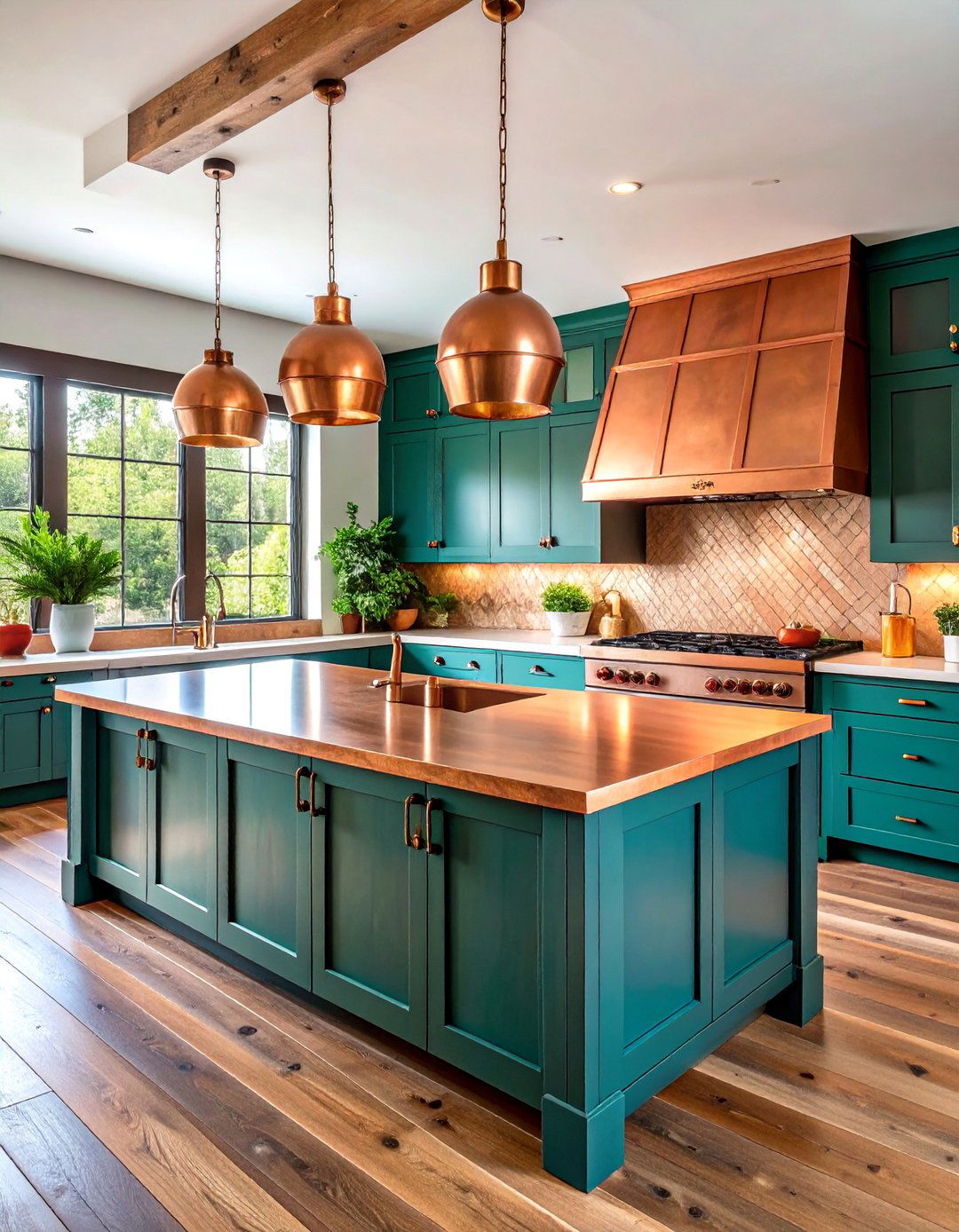
Transform your space with weathered barn wood cabinets that showcase decades of natural aging and character. This design features wide-plank reclaimed wood with visible grain patterns, paired with hammered copper countertops that develop a beautiful patina over time. Open shelving displays vintage mason jars and wooden utensils, while copper pendant lights cast warm shadows across the workspace. The farmhouse sink, crafted from aged copper, serves as a stunning focal point. Distressed wooden beams overhead complete the authentic primitive atmosphere, creating a kitchen that feels like it belongs in a historic countryside home.
2. Primitive Kitchen with Punched Tin Lighting
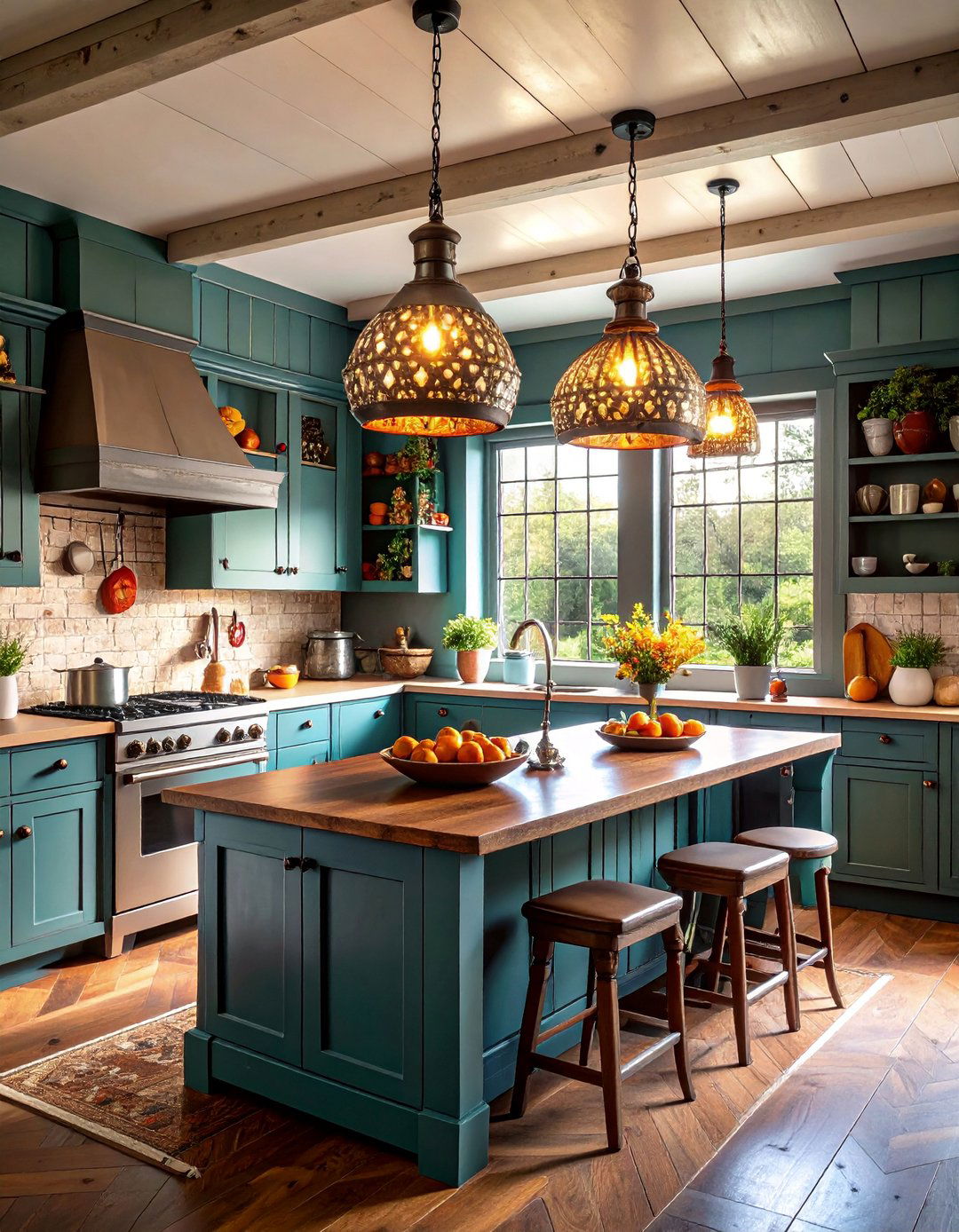
Create dramatic ambiance with handcrafted punched tin chandeliers and pendant lights that cast intricate shadow patterns throughout your kitchen. Dark-stained wooden cabinets with simple raised panels provide perfect contrast to the metallic lighting fixtures. Traditional punched tin designs feature star, willow, or geometric patterns that reflect early American craftsmanship. Complement the lighting with tin backsplashes and vintage pewter accessories displayed on open wooden shelves. The combination of warm wood tones and aged metal finishes creates an authentic primitive atmosphere that celebrates traditional metalworking artistry while providing functional illumination for modern cooking tasks.
3. Farmhouse Kitchen with Distressed Shaker Cabinets
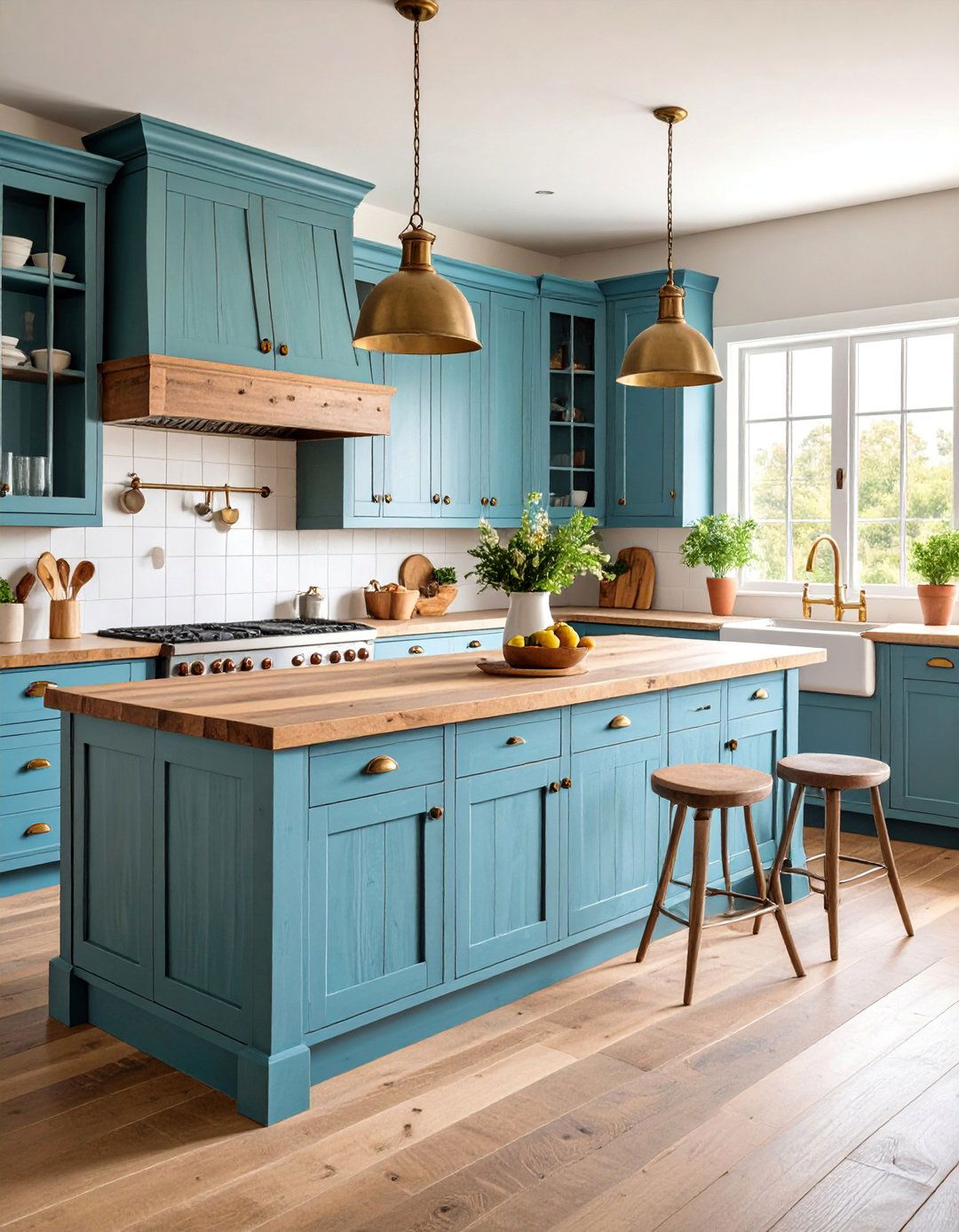
Embrace classic American craftsmanship with painted shaker-style cabinets featuring deliberate distressing and worn edges that suggest generations of use. Choose muted colors like sage green, barn red, or weathered white that complement the primitive aesthetic. Pair these cabinets with butcher block countertops made from thick hardwood planks, showcasing natural wood grain and knife marks that tell stories of daily use. Add vintage glass-front upper cabinets to display antique dishware and mason jar collections. Traditional brass hardware with an aged patina completes the look, creating a kitchen that perfectly balances functionality with timeless primitive charm.
4. Mason Jar Storage Kitchen with Open Shelving
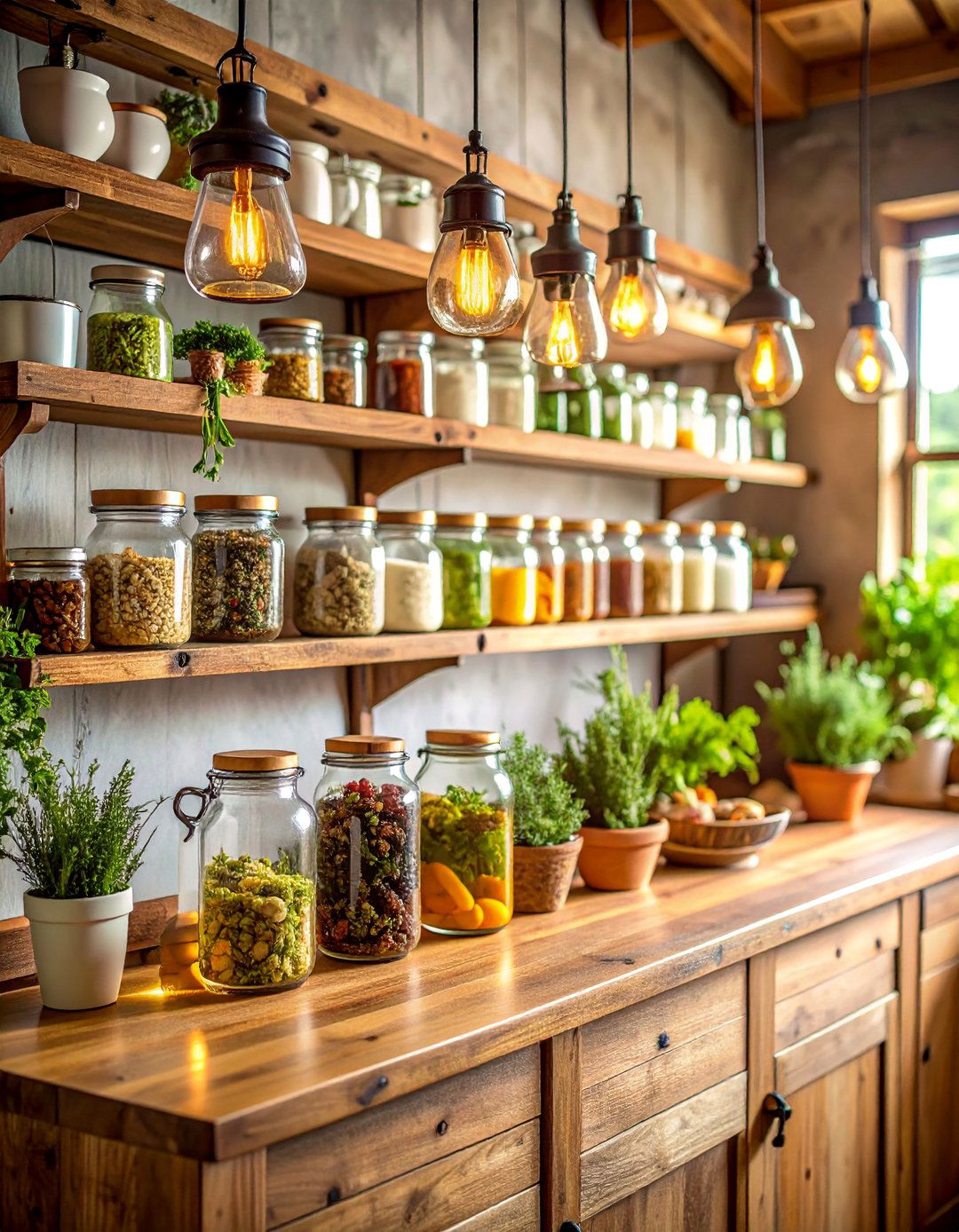
Design a functional primitive kitchen centered around mason jar storage systems that showcase both beauty and practicality. Install floating wooden shelves made from reclaimed barn wood to display collections of vintage mason jars filled with dried herbs, spices, and pantry staples. Create custom mason jar lighting fixtures above the kitchen island, using wide-mouth jars fitted with pendant light kits. Incorporate mason jar soap dispensers, utensil holders, and even flower vases throughout the space. The glass containers create visual interest while maintaining the primitive aesthetic, proving that functional storage can be both beautiful and authentically rustic in design.
5. Wrought Iron Primitive Kitchen with Stone Elements
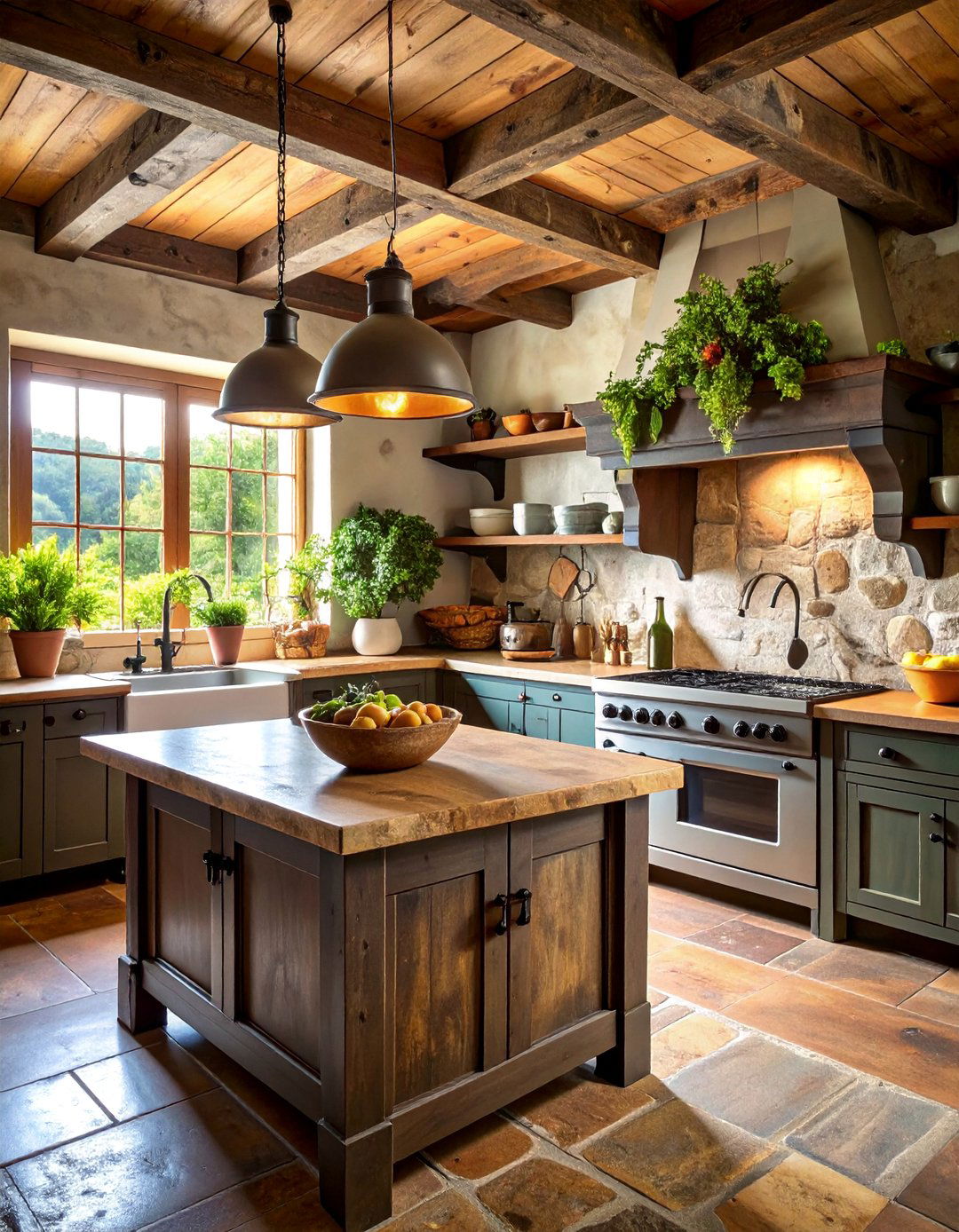
Combine the strength of wrought iron with natural stone elements to create a kitchen that feels both primitive and enduring. Install hand-forged wrought iron pot racks, light fixtures, and cabinet hardware that showcase traditional blacksmithing techniques. Pair these metal elements with natural stone countertops like soapstone or slate that develop character with age and use. Add a stone farmhouse sink as the centerpiece, surrounded by distressed wooden cabinets with wrought iron hinges and handles. The contrast between dark metal, natural stone, and weathered wood creates a primitive kitchen that celebrates the marriage of different natural materials.
6. Primitive Kitchen with Vintage Enamelware Collection
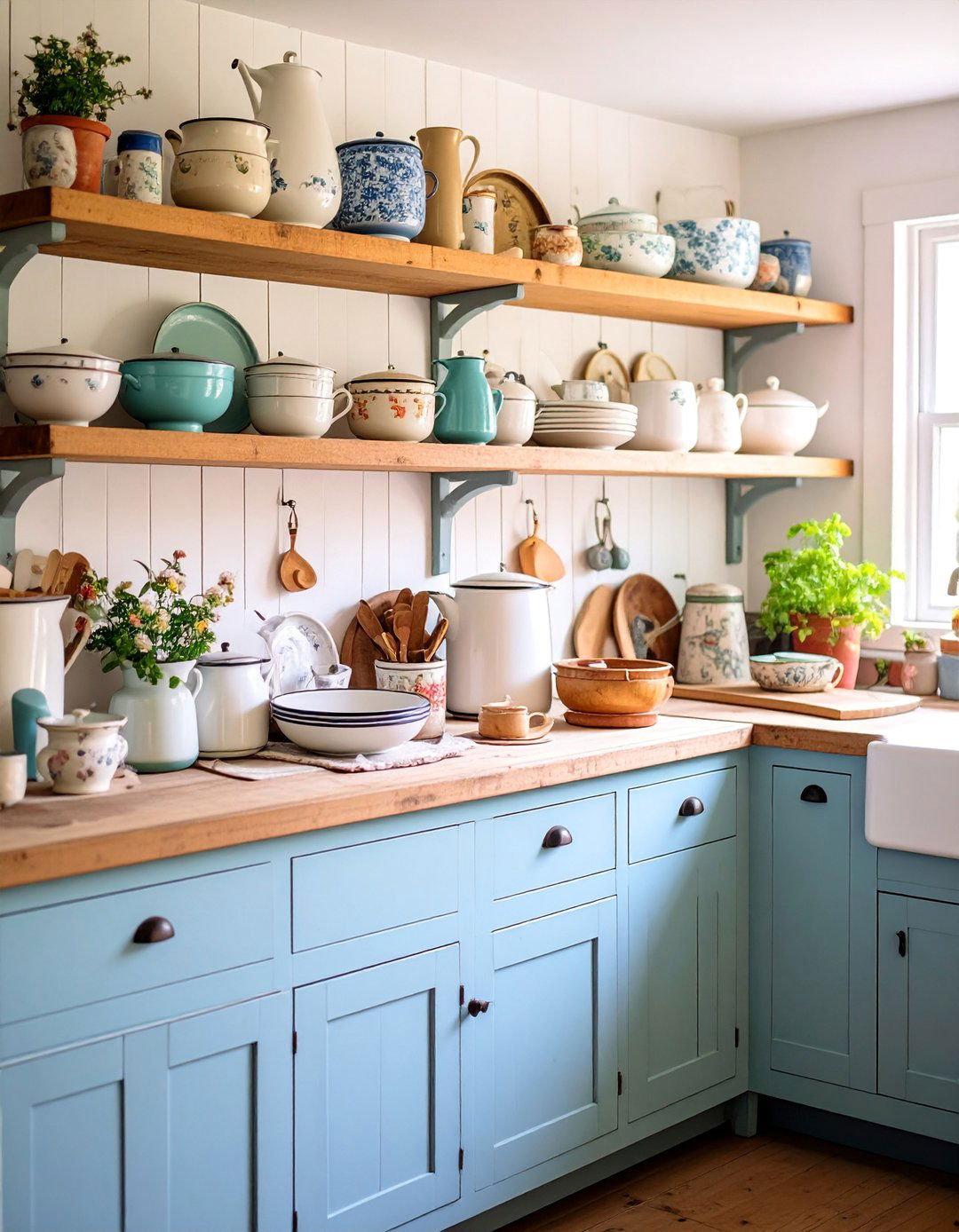
Build your kitchen design around a collection of vintage enamelware that brings authentic primitive charm to modern cooking spaces. Display speckled enamel plates, bowls, and pitchers on open shelving crafted from reclaimed wood. Use enamelware canisters for storage, creating both functional organization and visual appeal. Install vintage-style enamel pendant lights that echo the collection's aesthetic while providing task lighting. Complement the enamelware with distressed wooden cabinets painted in muted colors that highlight rather than compete with the collectibles. This approach creates a cohesive primitive kitchen where every functional element contributes to the overall authentic atmosphere and storytelling aesthetic.
7. Butcher Block Island Kitchen with Rustic Hardware
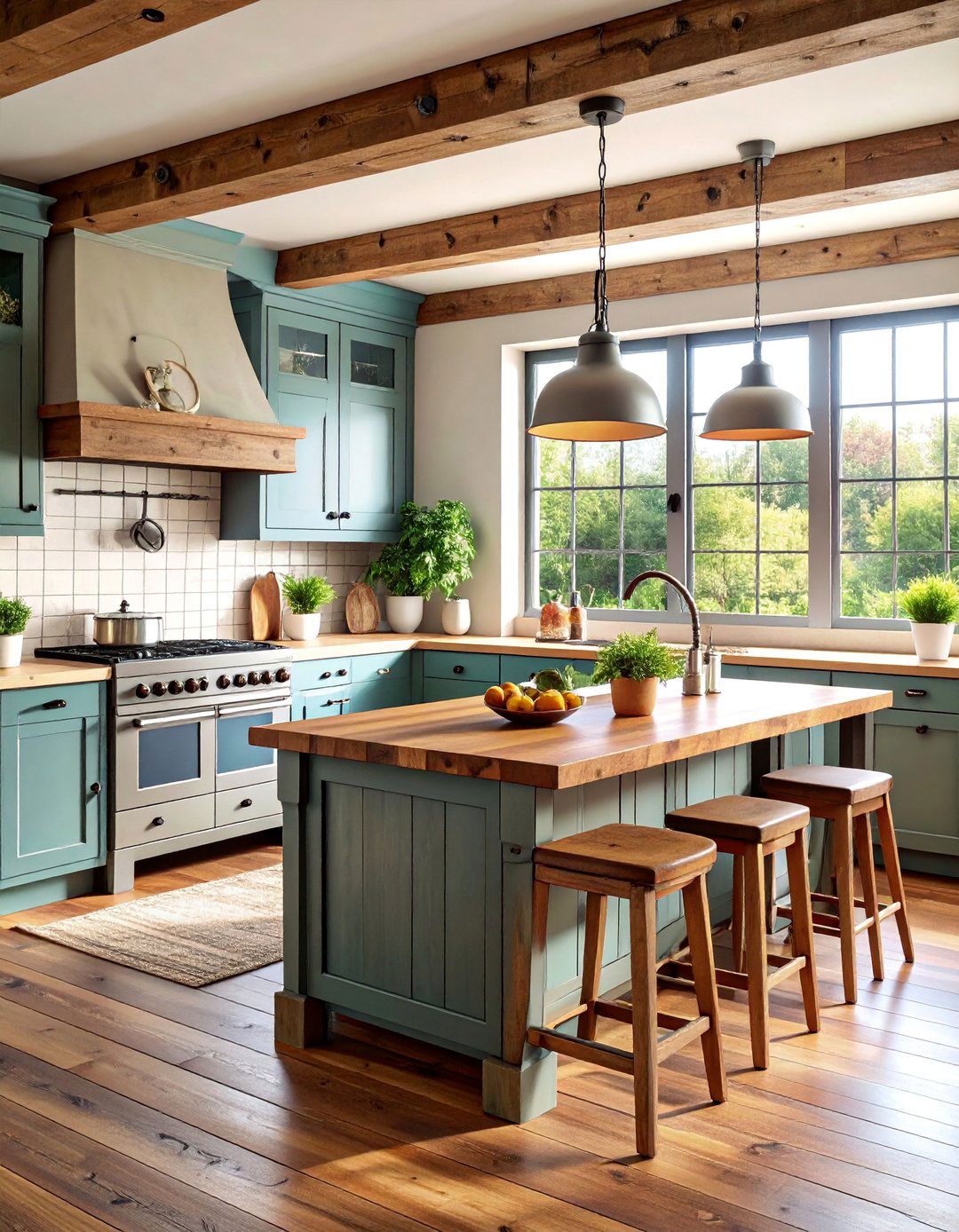
Center your primitive kitchen around a substantial butcher block island that serves as both workspace and gathering place for family meals. Choose thick hardwood planks with visible grain patterns and natural imperfections that speak to traditional craftsmanship. Surround the island with vintage bar stools crafted from reclaimed wood and wrought iron. Install rustic hardware throughout the kitchen, including hand-forged iron hinges, wooden knobs, and leather strap handles that reference traditional woodworking techniques. The butcher block surface develops character with daily use, showing knife marks and oil stains that tell the story of countless family meals and kitchen adventures.
8. Primitive Kitchen with Exposed Wooden Beam Ceiling
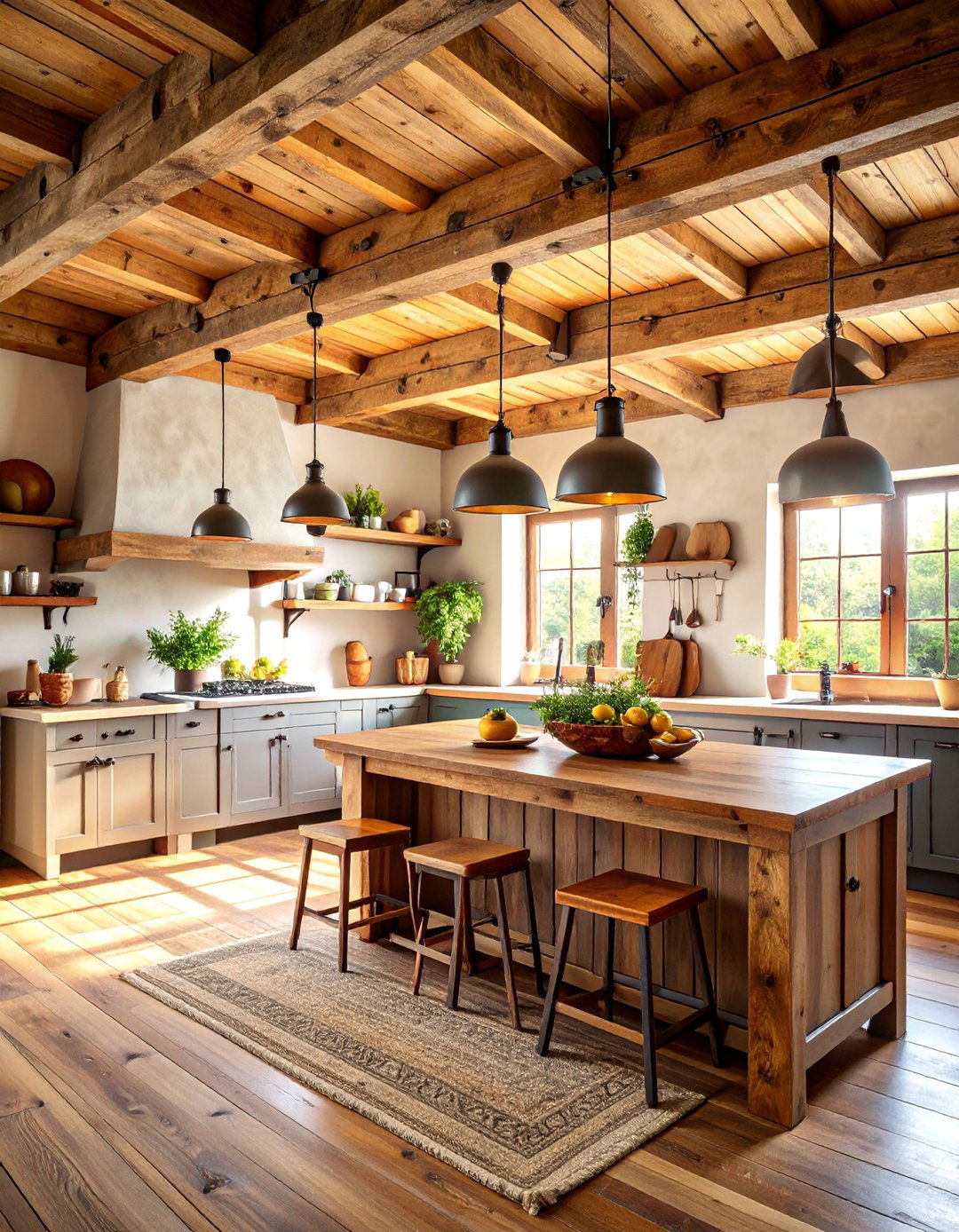
Create architectural drama with exposed wooden beams that bring the primitive aesthetic from floor to ceiling throughout your kitchen space. Choose weathered barn beams or hand-hewn timbers that show adze marks and natural checking from age. Suspend wrought iron pot racks and vintage-style pendant lights from the beams to maximize both function and visual impact. Paint the ceiling between beams in warm white or cream to provide contrast while maintaining the rustic atmosphere. The exposed beams create natural zones within the kitchen while adding authentic primitive character that connects the space to traditional building techniques and materials.
9. Vintage Apron Sink Kitchen with Wooden Countertops
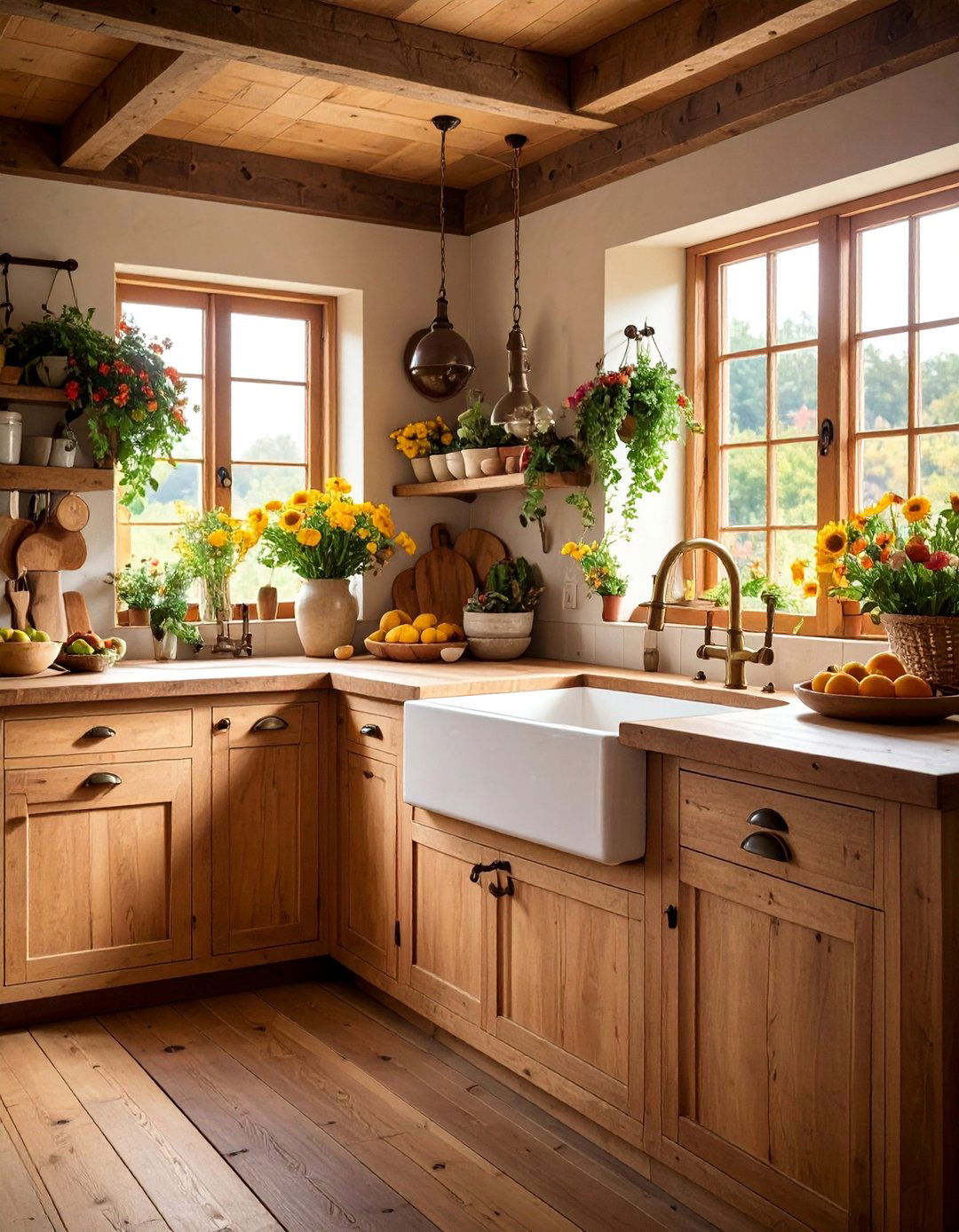
Design your primitive kitchen around a deep, vintage-style apron sink that becomes the functional and visual centerpiece of the space. Choose wide-plank wooden countertops that surround the sink, creating seamless integration between traditional materials. Install open shelving above the sink to display vintage dishes and mason jar collections where they can be easily accessed during daily kitchen tasks. Add a vintage-style brass faucet with cross handles that complement the sink's traditional styling. The combination of deep sink functionality with wooden countertops creates a workspace that honors both primitive aesthetics and practical cooking needs while maintaining authentic period character.
10. Primitive Kitchen with Handcrafted Pottery Display
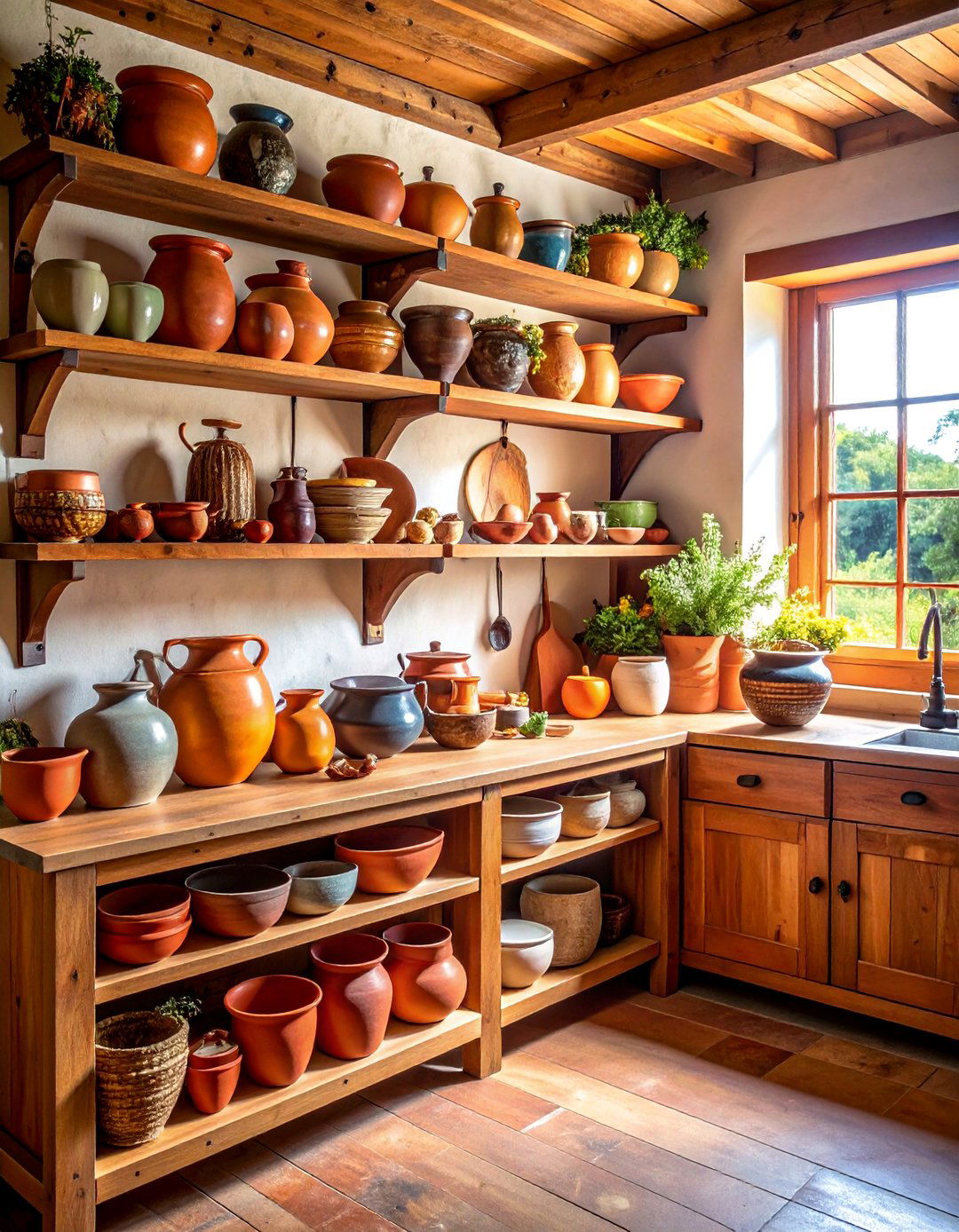
Showcase the beauty of handcrafted pottery throughout your primitive kitchen, creating displays that celebrate traditional ceramic artistry. Install wooden shelves and plate racks designed specifically to highlight stoneware crocks, redware bowls, and salt-glazed pottery collections. Choose earth-toned pottery in browns, grays, and deep reds that complement the primitive color palette. Use larger pottery pieces like crocks and churns as floor displays, while smaller items find homes on countertops and shelves. The handcrafted imperfections and glazing variations in the pottery add authentic character while providing functional storage and serving pieces that connect daily cooking to traditional craftsmanship.
11. Distressed Cabinet Kitchen with Vintage Hardware
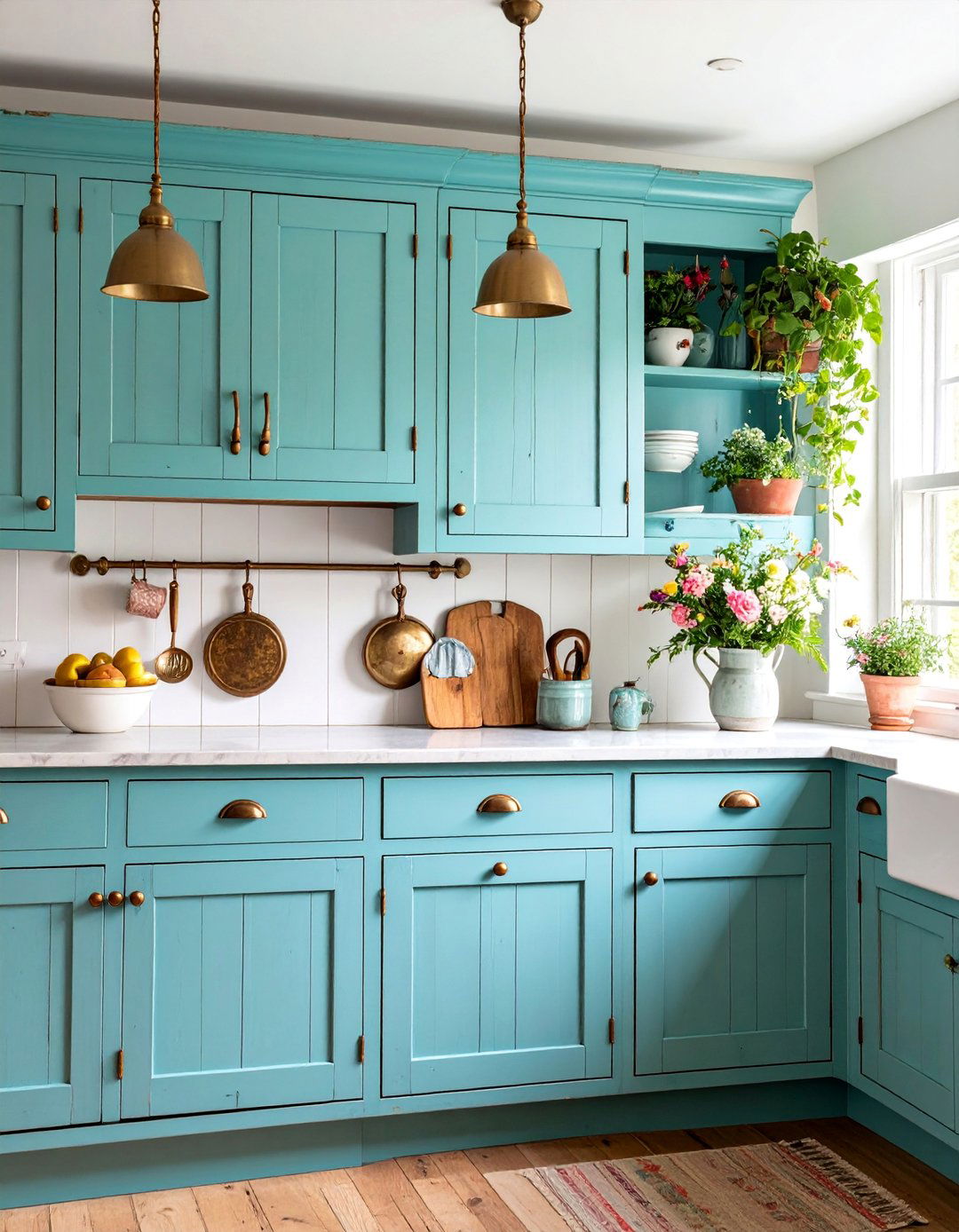
Transform ordinary cabinets into primitive focal points through strategic distressing techniques and carefully chosen vintage hardware that suggests decades of use. Sand edges and corners to reveal underlying wood or previous paint layers, creating natural wear patterns. Install vintage-style hardware including wooden knobs, wrought iron hinges, and aged brass pulls that reference traditional cabinetmaking. Pair distressed lower cabinets with glass-front uppers that display vintage dishware and mason jar collections. The combination of weathered surfaces and period-appropriate hardware creates cabinets that look like family heirlooms while providing modern storage functionality for contemporary kitchen needs.
12. Primitive Kitchen with Traditional Textile Elements
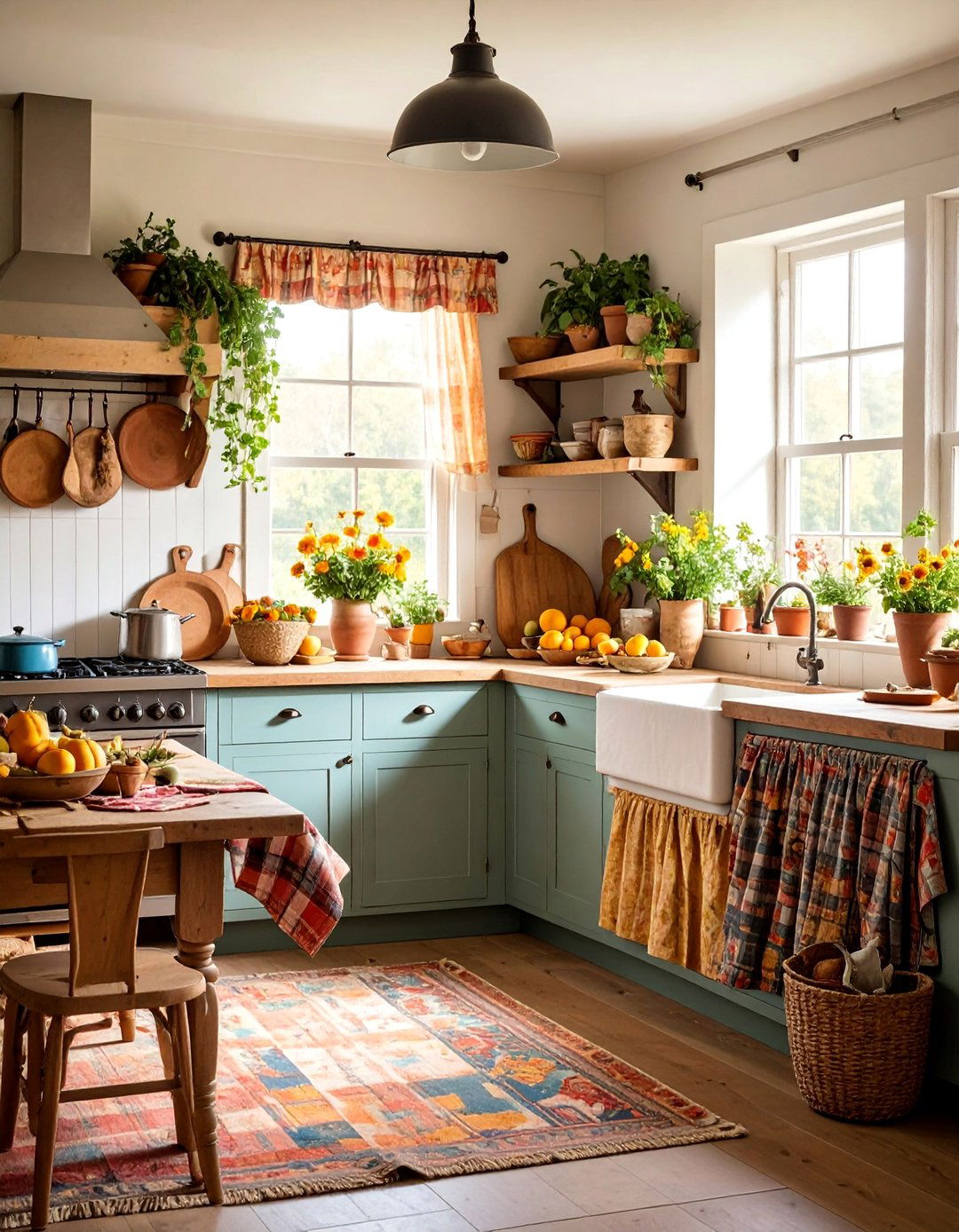
Incorporate handwoven textiles and traditional fabrics that bring warmth and authenticity to your primitive kitchen design. Install fabric cabinet skirts beneath open shelving to hide storage while adding soft texture to the space. Choose traditional patterns like homespun checks, woven stripes, and simple florals in muted colors that complement the primitive palette. Add textile elements through window treatments, chair cushions, and table runners that showcase traditional weaving techniques. Display vintage linens and feed sacks as wall art or functional towels. These textile touches soften the harder surfaces of wood and metal while connecting the kitchen to traditional domestic arts and crafts.
13. Copper Element Kitchen with Aged Patina
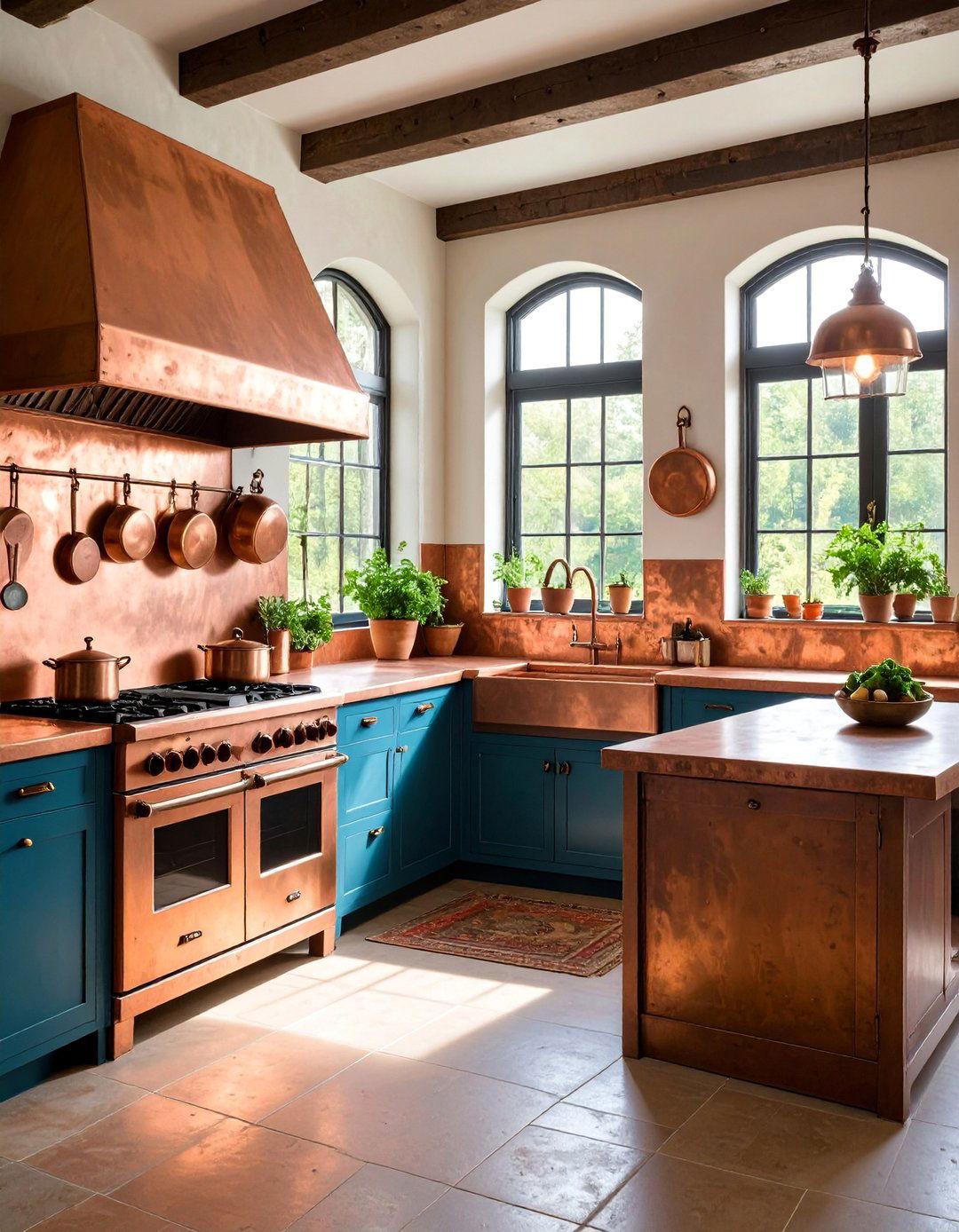
Build your primitive kitchen around copper elements that develop beautiful patina over time, creating surfaces that grow more beautiful with age and use. Install copper countertops, backsplashes, and farmhouse sinks that will naturally darken and develop unique color variations. Add copper pot racks, pendant lights, and decorative accessories that complement the larger copper installations. Pair these warm metal tones with distressed wooden cabinets and natural stone flooring that provide perfect contrast. The copper elements create visual warmth while providing antimicrobial surfaces that are both beautiful and functional. Over time, the natural aging process ensures that your kitchen develops unique character that cannot be replicated.
14. Primitive Kitchen with Cast Iron Cookware Display
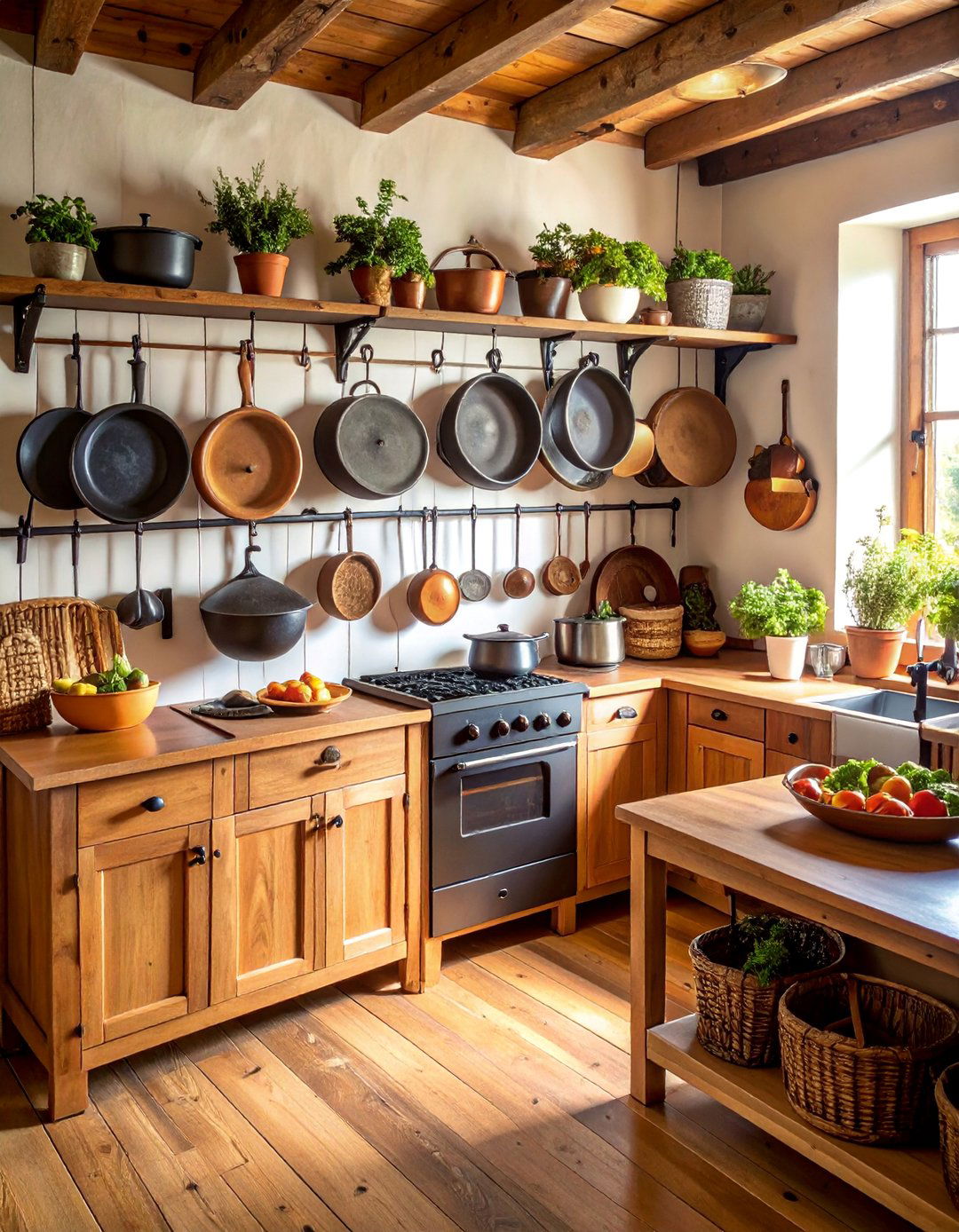
Create a functional primitive kitchen that celebrates cast iron cookware as both cooking tool and decorative element throughout the space. Install wrought iron pot racks and hooks that showcase collections of vintage cast iron skillets, Dutch ovens, and griddles. Build open shelving specifically designed to accommodate the weight and size of cast iron pieces while making them easily accessible for daily cooking. Add cast iron trivets and serving pieces that bridge the gap between cookware and table service. The deep black patina of well-seasoned cast iron provides dramatic contrast against wooden surfaces while connecting modern cooking to traditional techniques and time-tested materials.
15. Primitive Kitchen with Wooden Utensil Collections
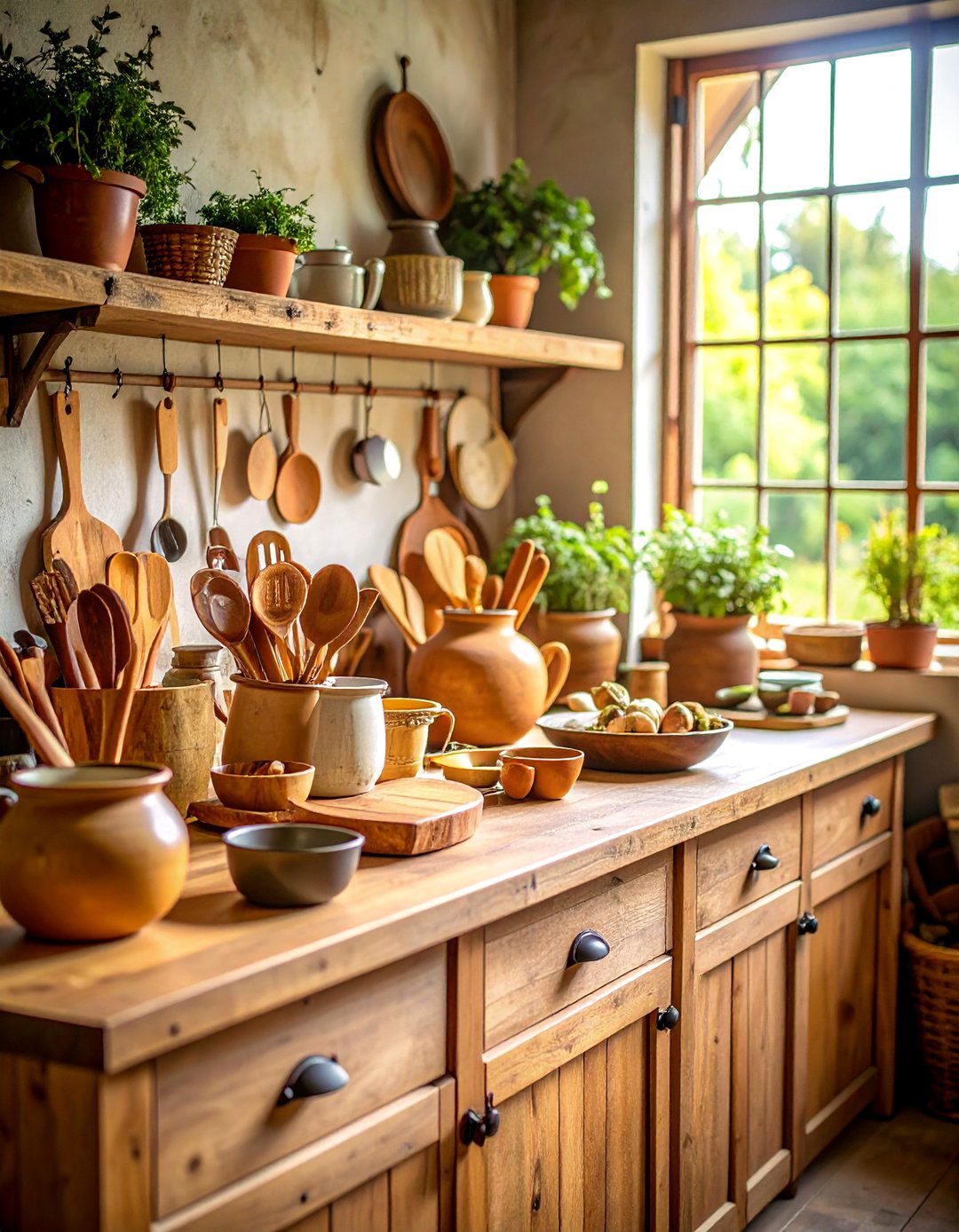
Design your kitchen around extensive collections of wooden utensils that bring warmth and functionality to every cooking task. Create dedicated storage solutions including wooden utensil crocks, wall-mounted racks, and drawer organizers that showcase different types of wooden spoons, spatulas, and serving pieces. Display vintage wooden bowls, cutting boards, and breadboards as both functional items and decorative elements. Install wooden shelving that complements the utensil collections while providing additional storage for wooden serving pieces. The natural wood tones create visual cohesion throughout the kitchen while connecting daily cooking activities to traditional woodworking crafts and sustainable material choices.
16. Primitive Kitchen with Natural Stone Backsplash
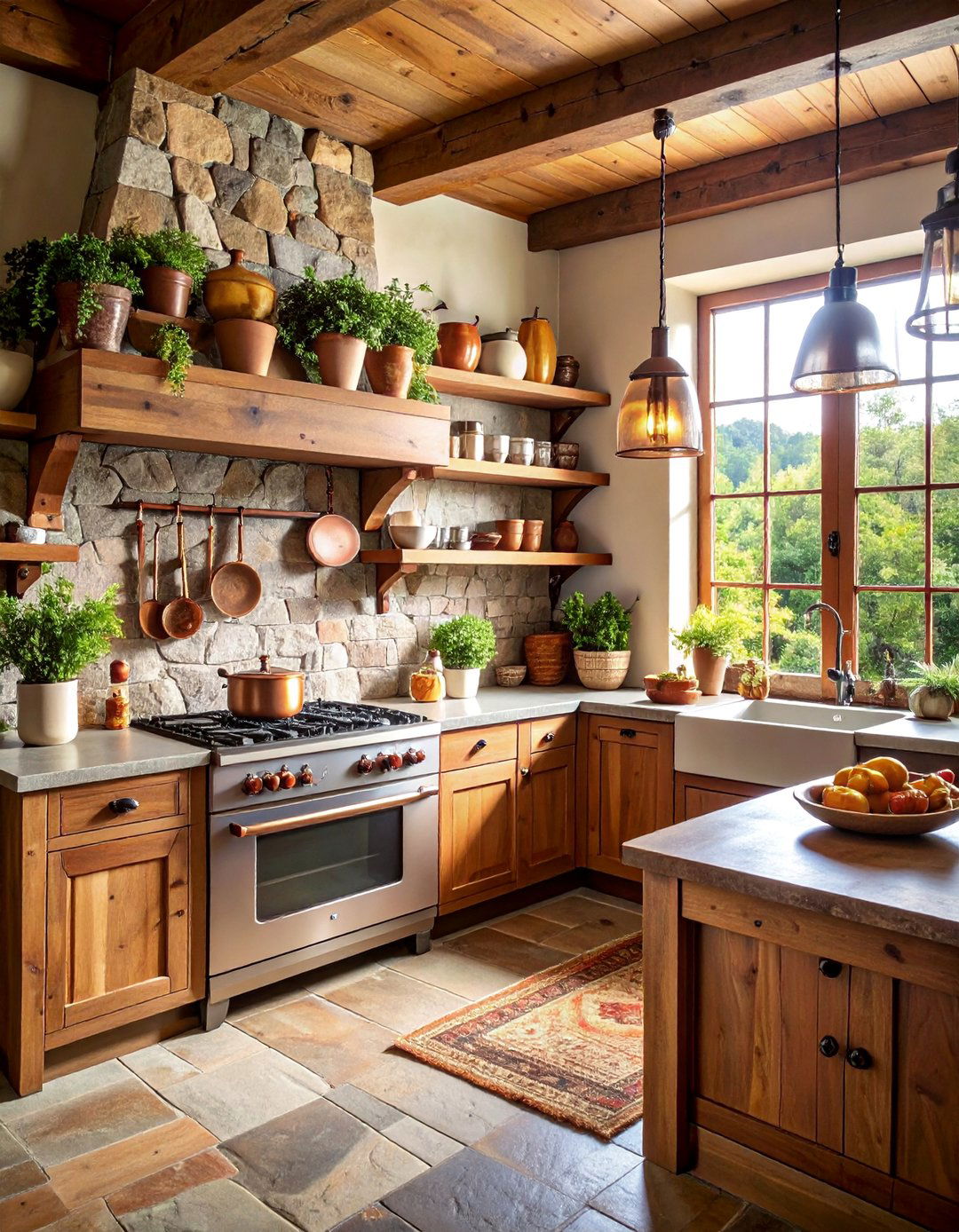
Incorporate natural stone backsplashes that bring organic texture and primitive beauty to your kitchen design. Choose fieldstone, slate, or rough-cut granite that showcases natural color variations and surface textures. Install the stone in traditional patterns that reference historical building techniques while providing practical protection for cooking areas. Complement the stone with wooden shelving and copper or wrought iron hardware that enhance rather than compete with the natural material. The stone backsplash creates a focal point that connects the kitchen to outdoor elements while providing easy-to-clean surfaces that develop character through daily use and natural aging processes.
17. Primitive Kitchen with Vintage Scale Collections
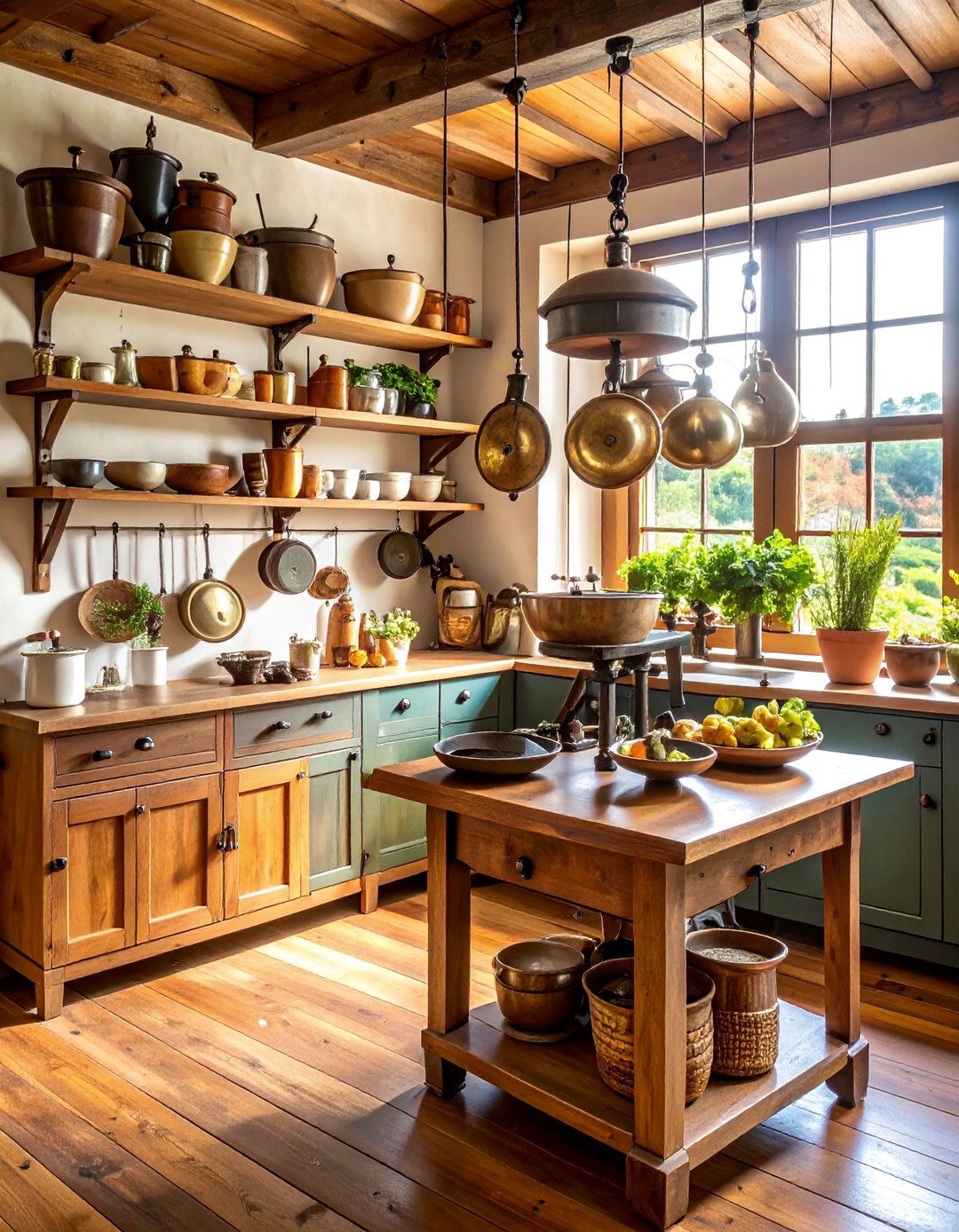
Center your primitive kitchen design around collections of vintage scales that combine functionality with authentic period character. Display various sizes of balance scales, spring scales, and hanging scales throughout the kitchen as both decorative elements and working tools. Install wooden shelving designed to accommodate the different scale types while making them accessible for cooking and baking tasks. Use the scales for measuring ingredients, displaying seasonal produce, or holding kitchen accessories like wooden spoons and measuring cups. The mechanical beauty of vintage scales adds visual interest while connecting modern cooking to traditional methods of measurement and food preparation that predate electronic convenience.
18. Rustic Herb Garden Kitchen with Drying Racks
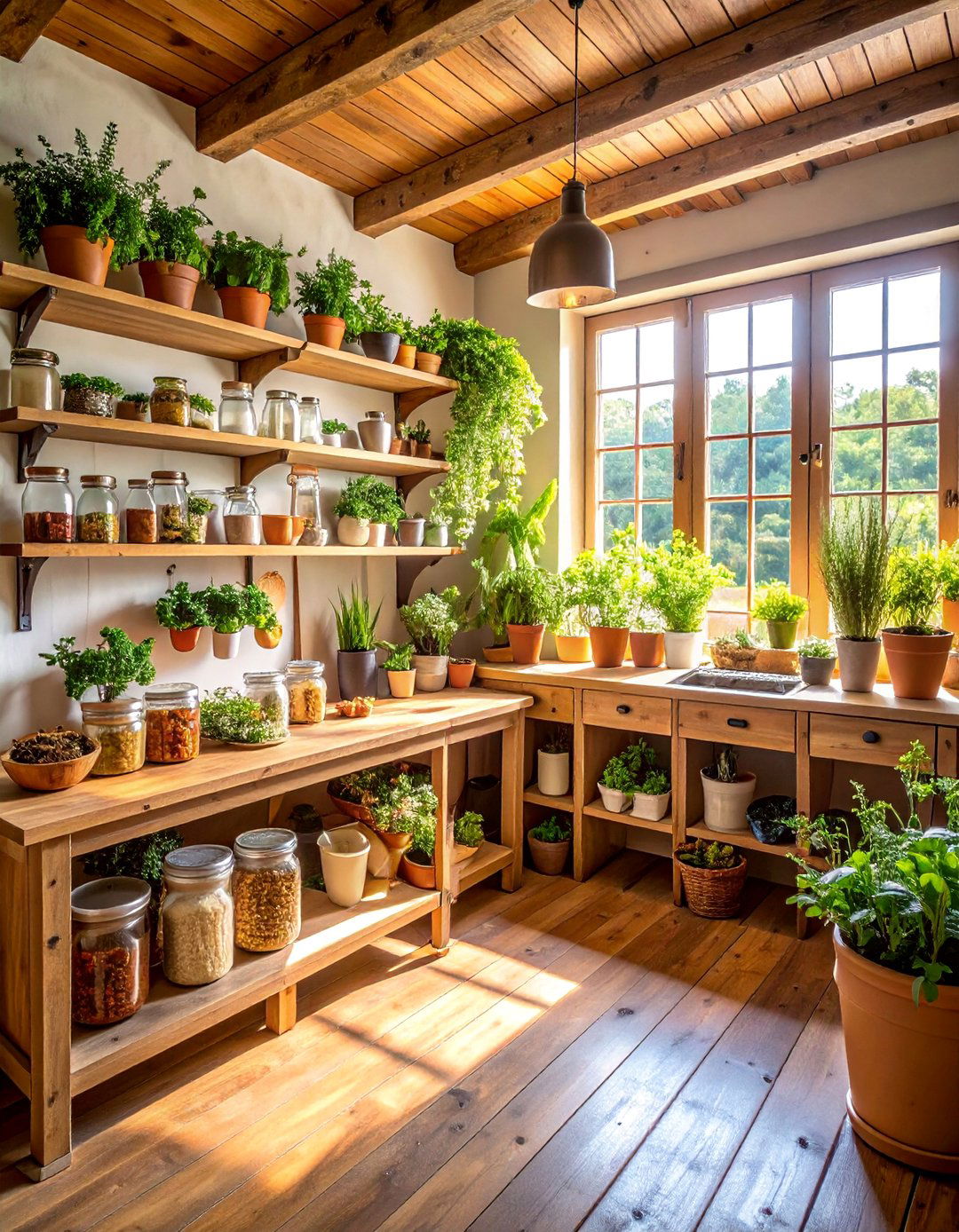
Create a primitive kitchen that celebrates herb gardening and traditional food preservation through integrated growing and drying systems. Install wooden herb drying racks suspended from exposed ceiling beams, creating functional displays that fill the kitchen with natural fragrances. Build window box planters using reclaimed wood to grow fresh herbs within easy reach of cooking areas. Add vintage-style mason jars for storing dried herbs and spices, creating beautiful and functional storage solutions. Include traditional mortar and pestle sets for grinding herbs and spices. This design connects daily cooking to seasonal rhythms while providing fresh, homegrown ingredients that enhance both flavor and authentic primitive atmosphere.
19. Primitive Kitchen with Handforged Iron Details
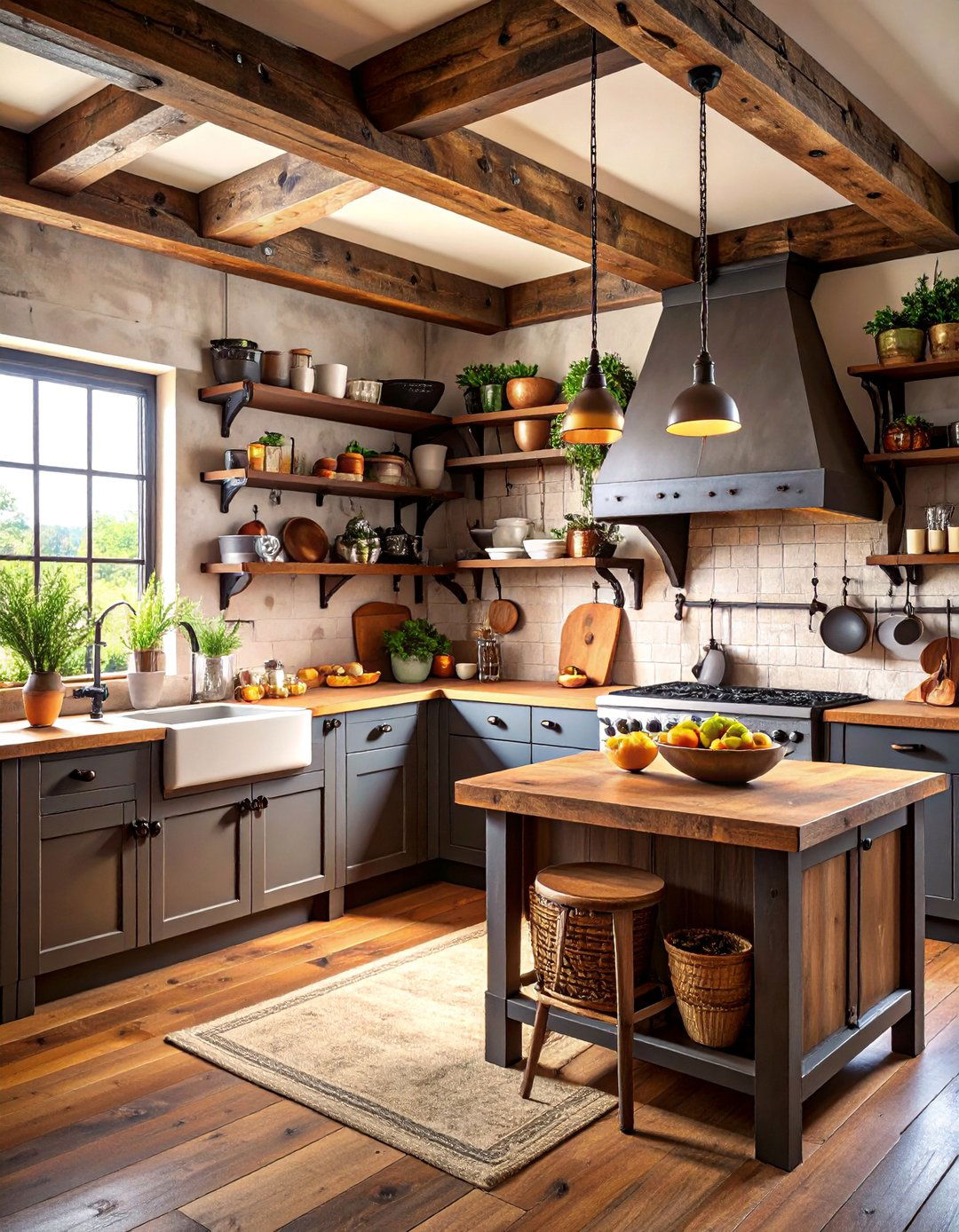
Incorporate handforged iron details throughout your kitchen that showcase traditional blacksmithing artistry while providing functional hardware and decorative elements. Install custom iron pot racks, cabinet hardware, and light fixtures that feature hammer marks and irregular surfaces characteristic of hand-forged metalwork. Add iron trivets, hooks, and serving pieces that bridge functional and decorative uses. Choose iron elements with traditional finishes like wax coating or oil rubbing that prevent rust while maintaining authentic appearance. The handforged iron creates visual interest through its organic irregularities while connecting the kitchen to traditional metalworking crafts that prioritized durability and functionality over mass-produced uniformity.
20. Primitive Kitchen with Reclaimed Wood Flooring
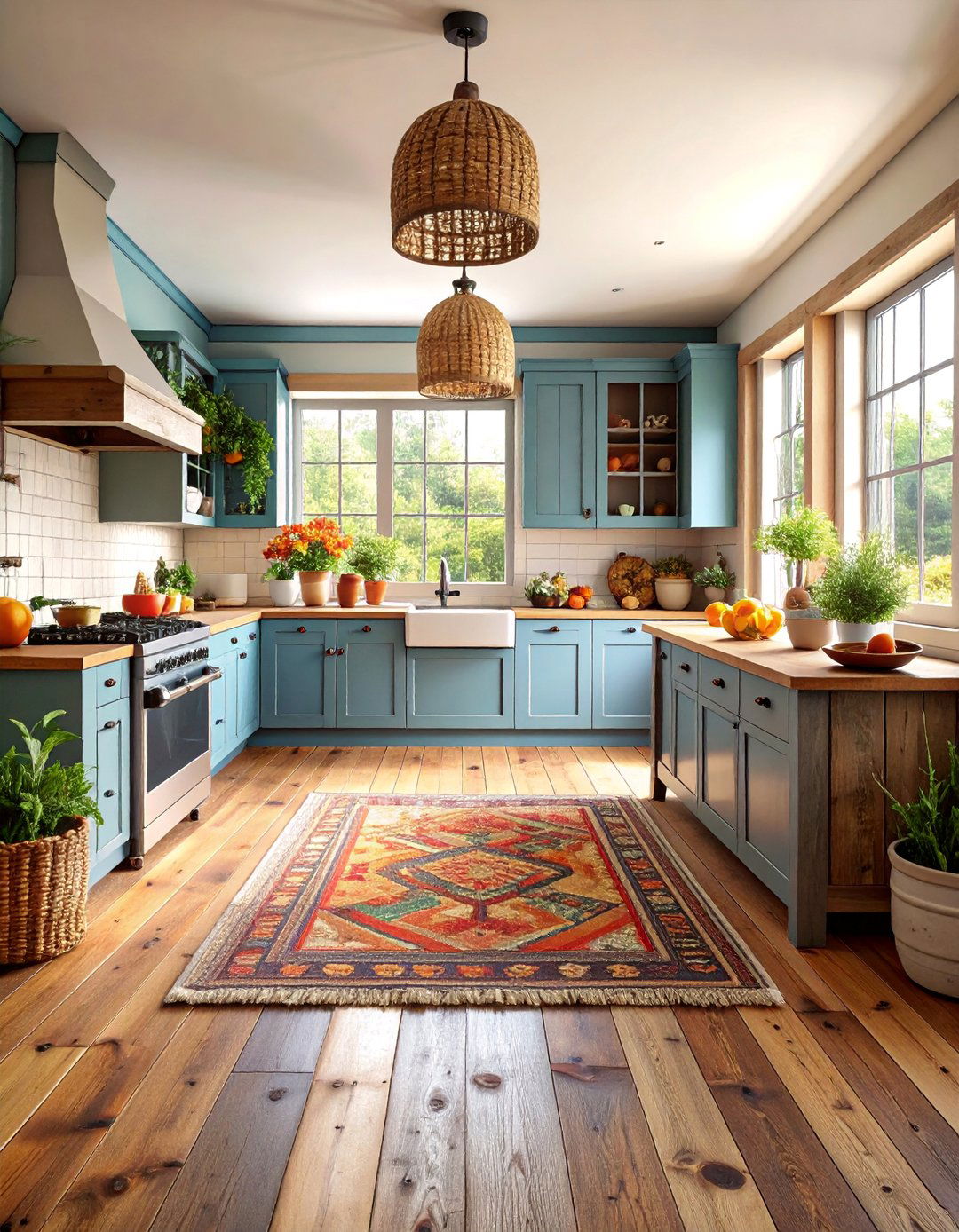
Ground your primitive kitchen with reclaimed wood flooring that brings history and character to every step throughout the space. Choose wide-plank flooring from old barns, farmhouses, or industrial buildings that showcase nail holes, saw marks, and natural aging. Install the flooring with traditional techniques that highlight rather than hide the wood's imperfections and character marks. Complement the flooring with braided rugs, woven mats, and other traditional textile floor coverings that add warmth and comfort. The reclaimed wood provides visual foundation that connects all other kitchen elements while telling stories of previous uses and creating surfaces that continue to develop character through daily use.
21. Primitive Kitchen with Traditional Canning Setup
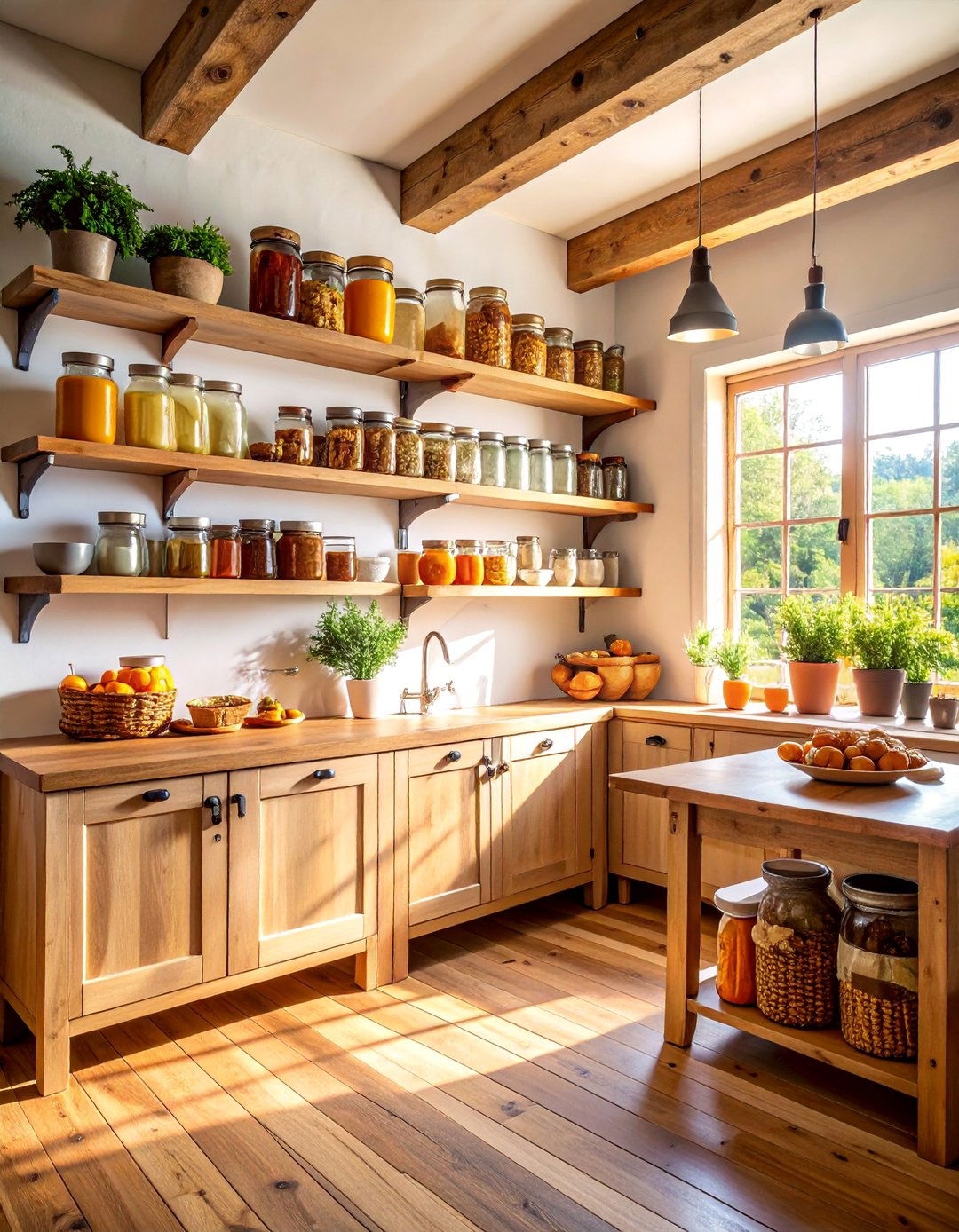
Design a primitive kitchen that honors traditional food preservation through dedicated canning and preserving areas that combine function with authentic period character. Install wooden shelving specifically designed to display and store canning jars, with special attention to organization by contents and seasons. Create a dedicated canning station with appropriate workspace, storage for equipment, and easy access to heat sources. Add vintage canning accessories like wooden spoons, jar lifters, and preservation crocks that connect modern preserving to traditional techniques. Include display areas for seasonal preserves that showcase the beauty of home-canned goods while providing easy access to pantry staples throughout the year.
22. Primitive Kitchen with Vintage Icebox Storage
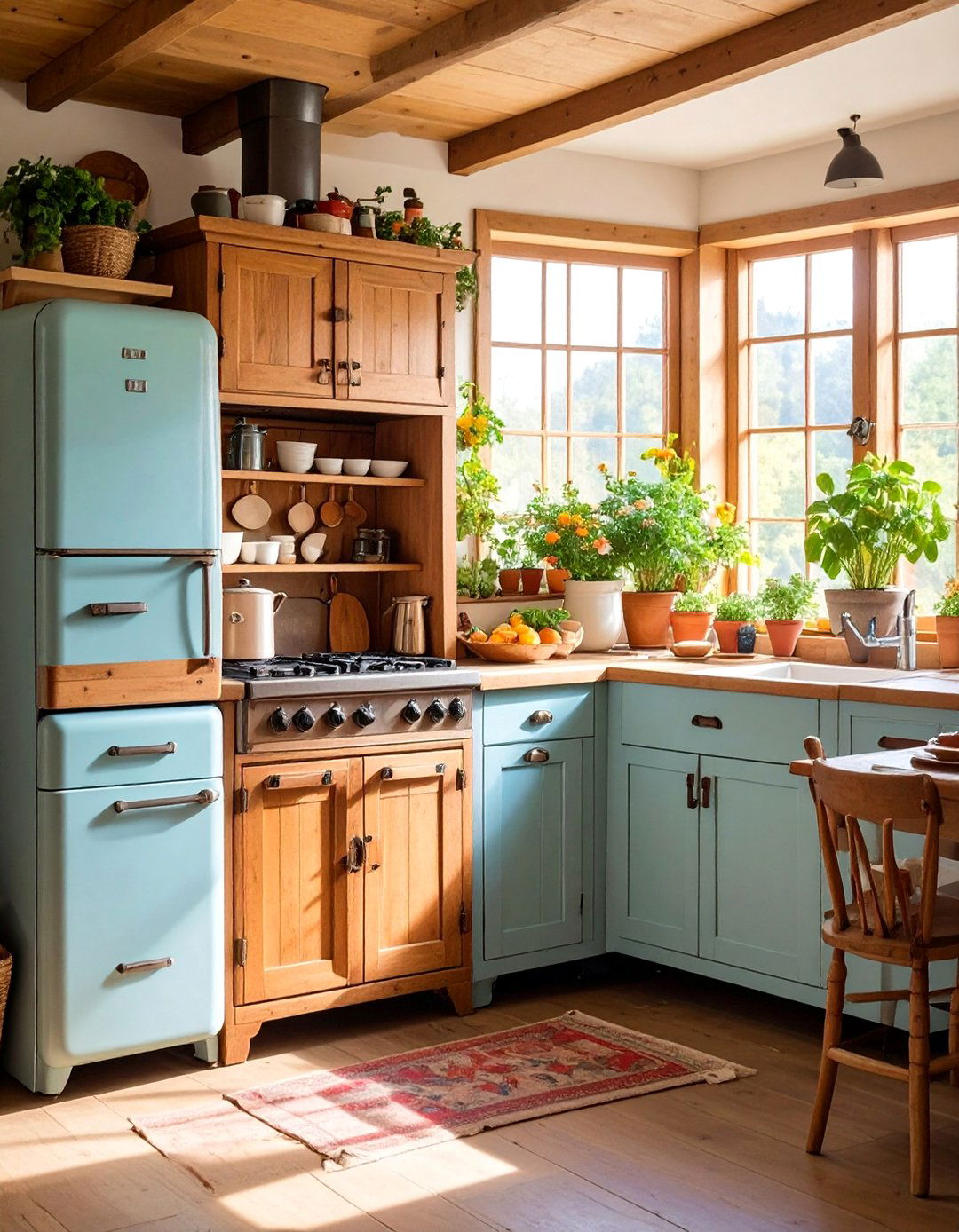
Incorporate vintage icebox-style storage that brings authentic primitive cooling solutions to modern kitchen design. Choose reproduction or restored iceboxes that feature wooden construction, metal hardware, and traditional insulation systems adapted for contemporary use. Use these pieces for specialized storage of vegetables, beverages, or seasonal items that benefit from cool, dark storage conditions. Complement the icebox with other period-appropriate storage solutions like wooden pantry cabinets, metal bread boxes, and ceramic crocks. The icebox serves as both functional storage and conversation piece that connects daily kitchen activities to pre-electric food storage methods while providing unique storage solutions for modern needs.
23. Primitive Kitchen with Open Fire Cooking Elements
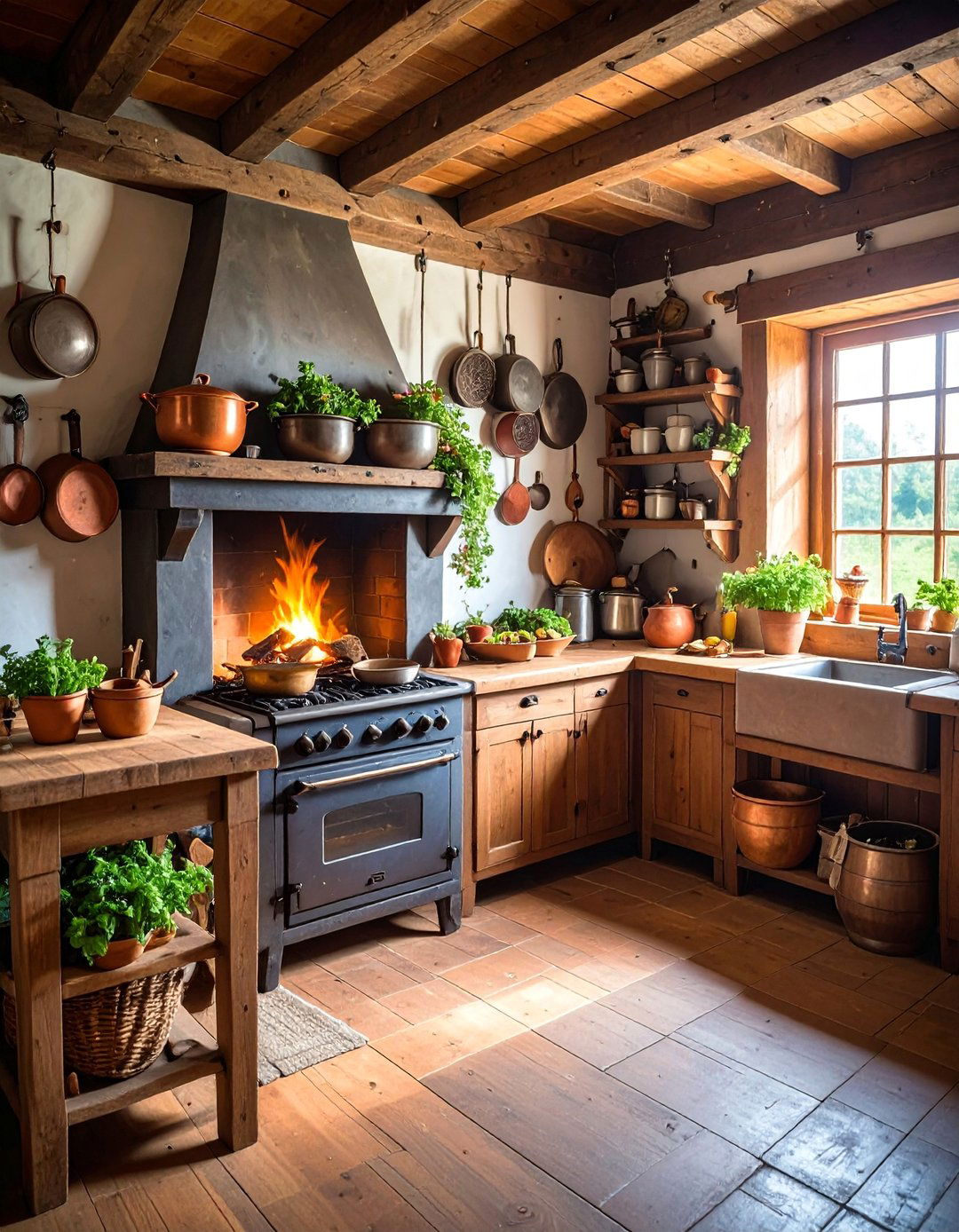
Create a primitive kitchen that celebrates open fire cooking through carefully integrated hearth elements and traditional cooking tools. Install a cooking fireplace or wood-burning stove that provides both heat and cooking capability while serving as dramatic focal point. Add traditional fireplace cooking accessories like cast iron pot hooks, trivets, and long-handled utensils designed for hearth cooking. Include wooden storage for kindling and cooking wood that becomes part of the decorative scheme. Design seating areas around the hearth that encourage gathering and conversation. This design connects modern cooking to the most primitive preparation methods while creating dramatic atmosphere that celebrates fire as the foundation of all cooking traditions.
24. Primitive Kitchen with Vintage Breadbox Collections
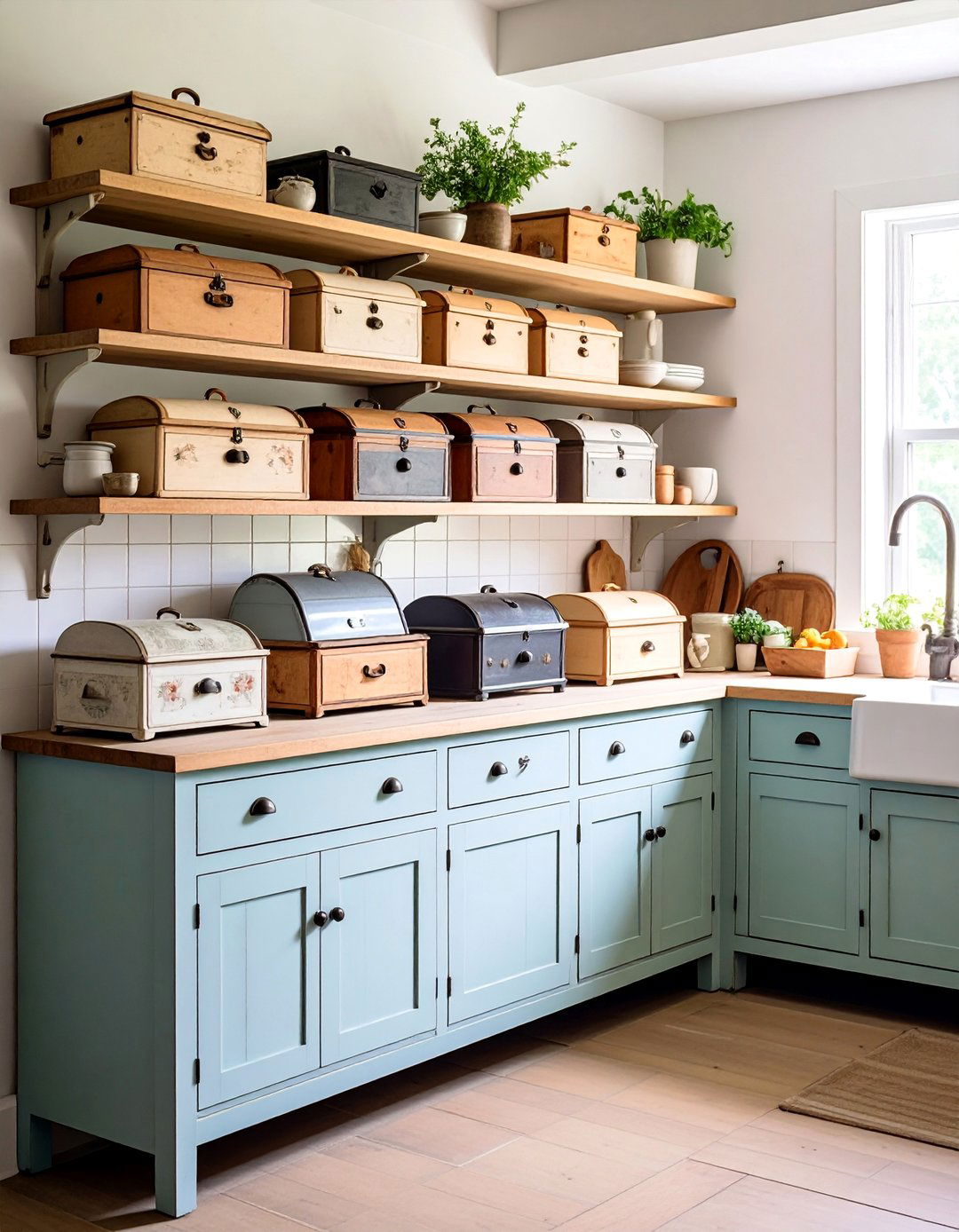
Focus your primitive kitchen design around collections of vintage breadboxes that combine practical storage with authentic period character. Display various sizes and styles of breadboxes including wooden, metal, and enamelware versions that showcase different eras of kitchen design. Use the breadboxes for their intended purpose while also storing other kitchen items like linens, utensils, or seasonal decorations. Install shelving specifically designed to accommodate breadbox collections while making them easily accessible for daily use. The breadboxes provide visual interest through their varied materials and designs while connecting daily bread storage to traditional kitchen organization methods that prioritized freshness and pest protection.
25. Primitive Kitchen with Traditional Workbench Island
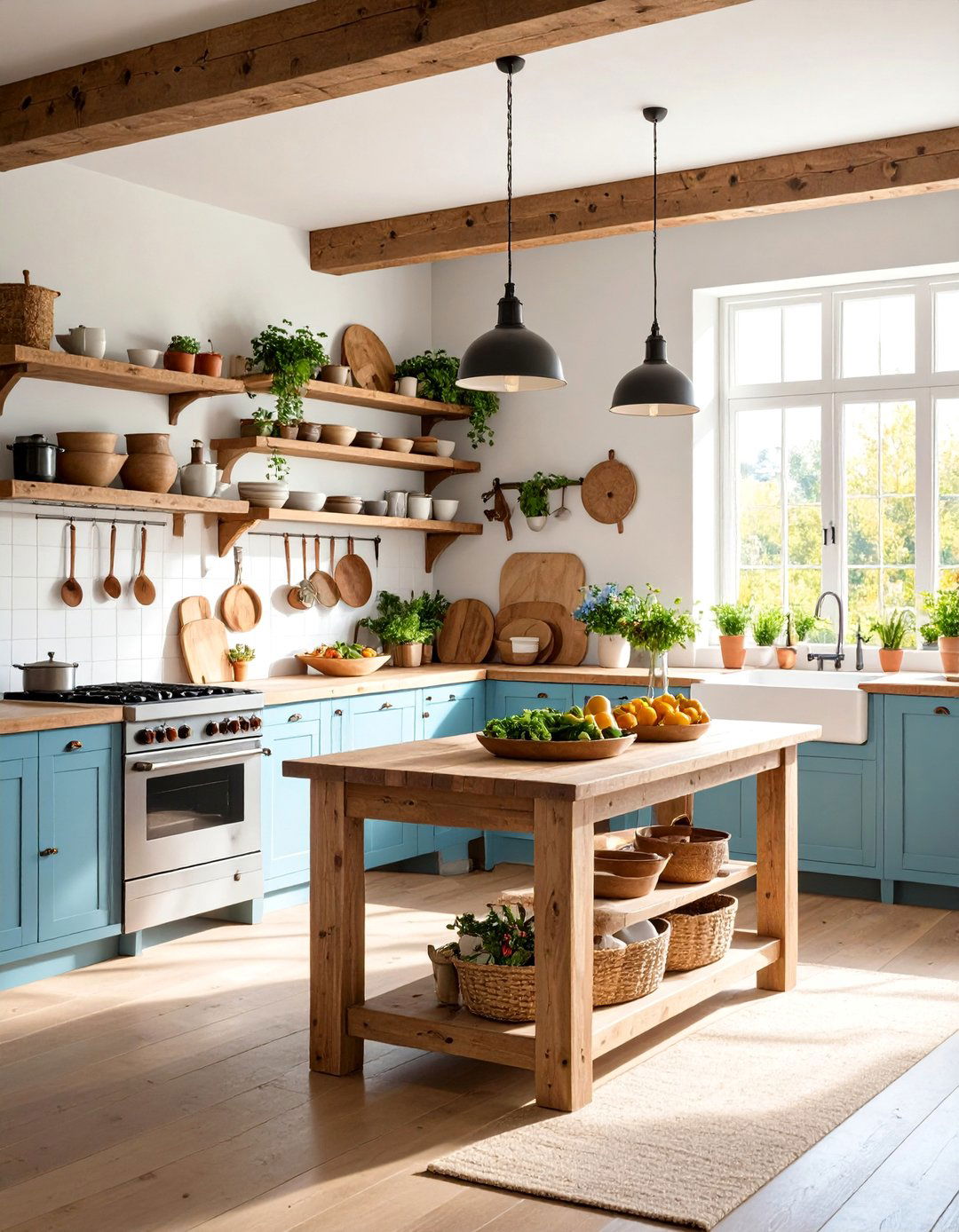
Transform your kitchen island into a traditional workbench that celebrates primitive woodworking while providing modern functionality for food preparation. Choose thick hardwood construction with visible joinery techniques like mortise and tenon or dovetail joints that showcase traditional craftsmanship. Install tool storage areas adapted for kitchen utensils, creating organization systems that reference traditional workshop storage. Add a traditional woodworking vise adapted to hold cutting boards or serving trays during preparation. Include wooden tool racks and storage cubbies that keep kitchen tools organized and accessible. The workbench island creates substantial workspace while connecting daily cooking activities to traditional crafts that prioritized quality construction and functional design.
Conclusion:
Primitive kitchens offer timeless appeal through their celebration of traditional craftsmanship, natural materials, and authentic character that develops with age and use. These design approaches create spaces that honor our culinary heritage while providing fully functional environments for modern cooking needs. By incorporating elements like reclaimed wood, traditional metals, vintage accessories, and handcrafted details, primitive kitchens become gathering places that connect families to simpler times and traditional values. The beauty of primitive design lies in its emphasis on quality, durability, and authentic character that grows more beautiful with time.



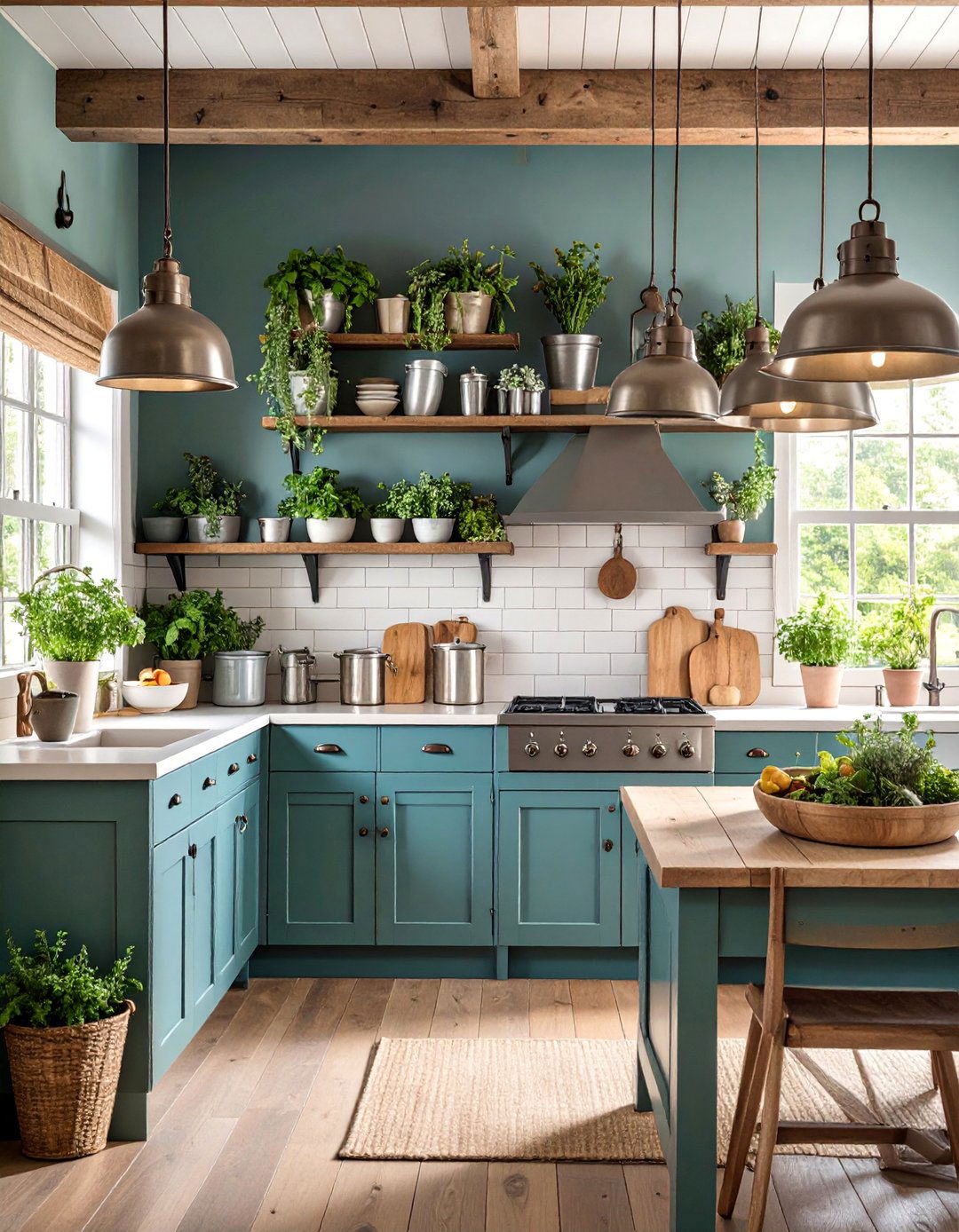
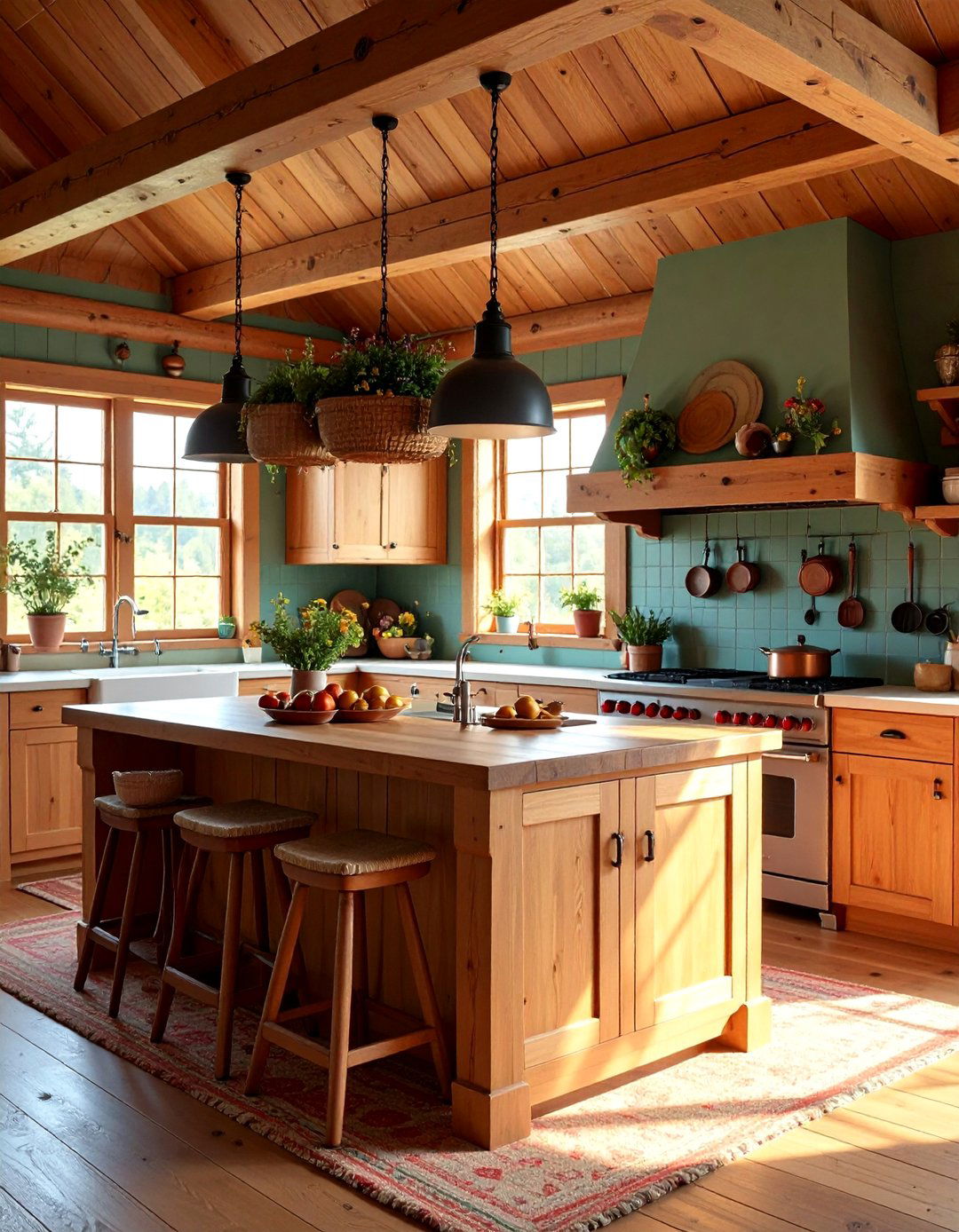

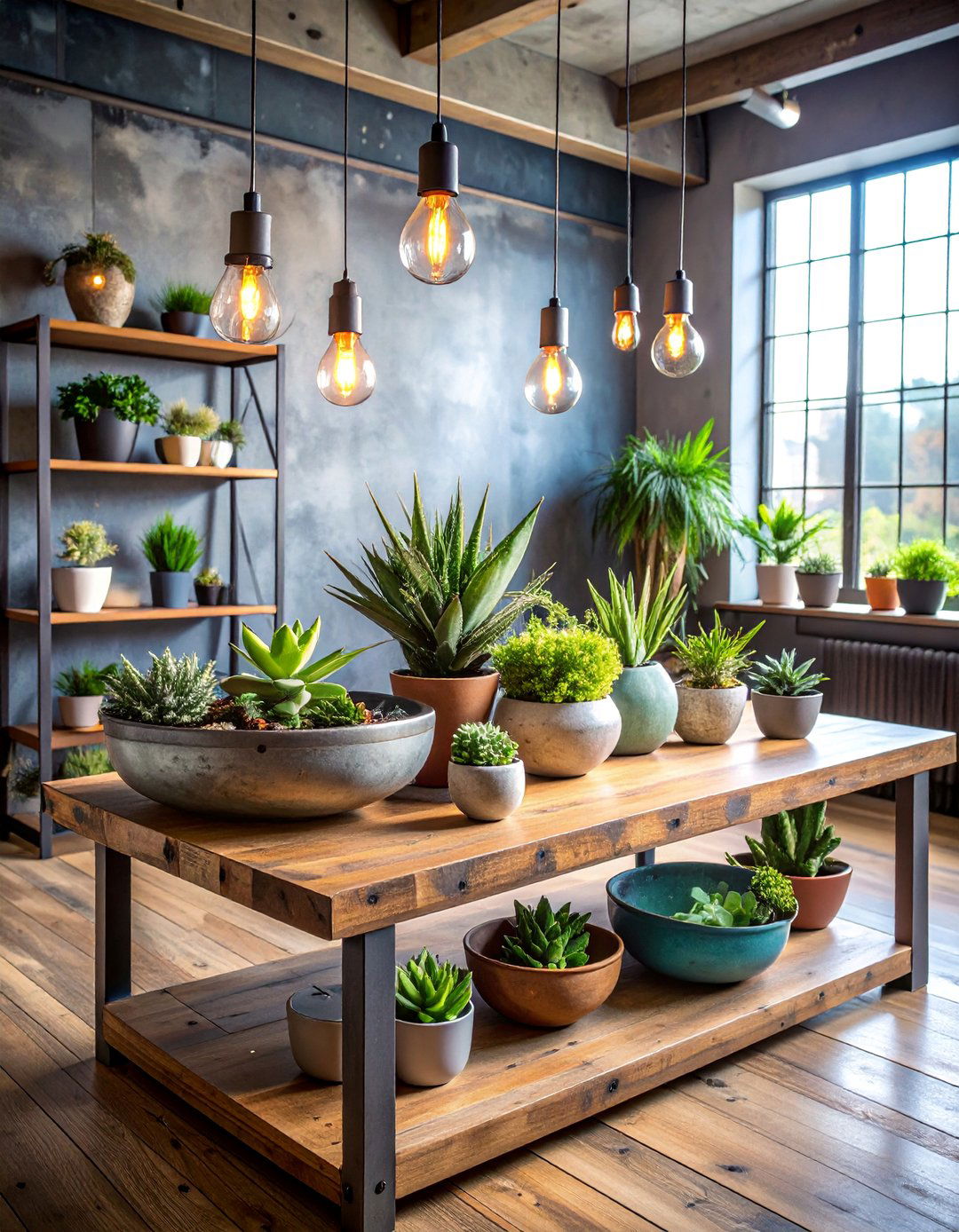
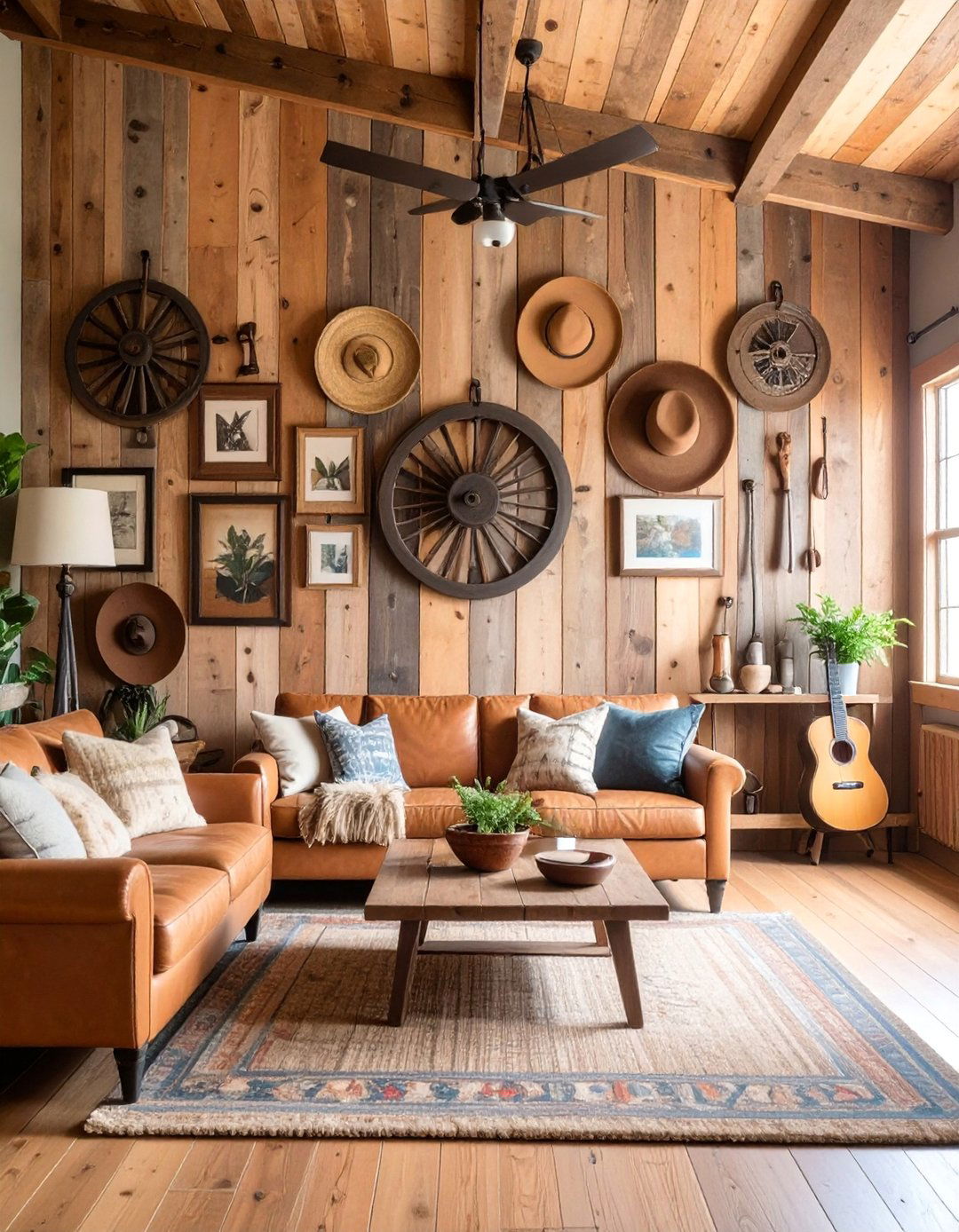
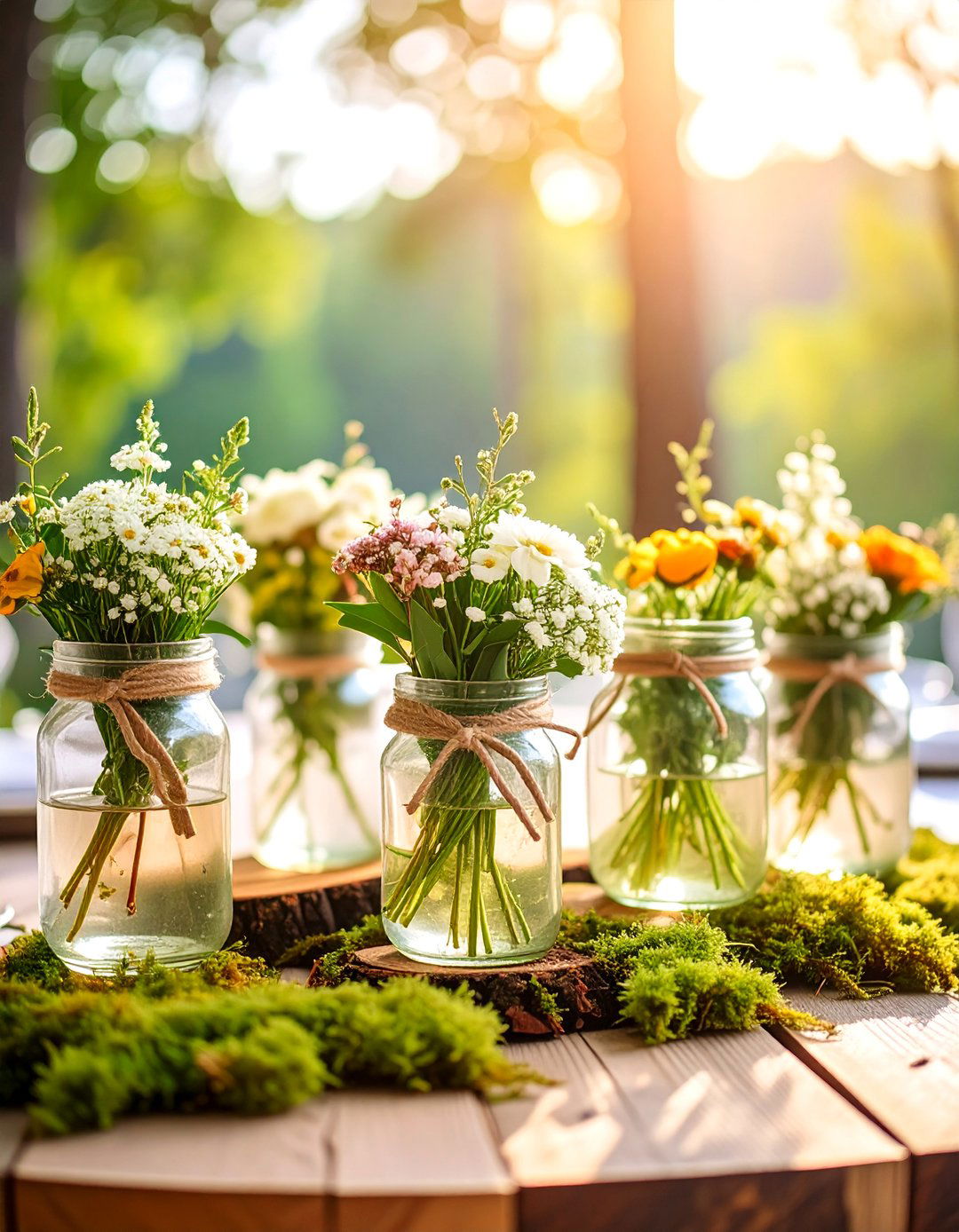
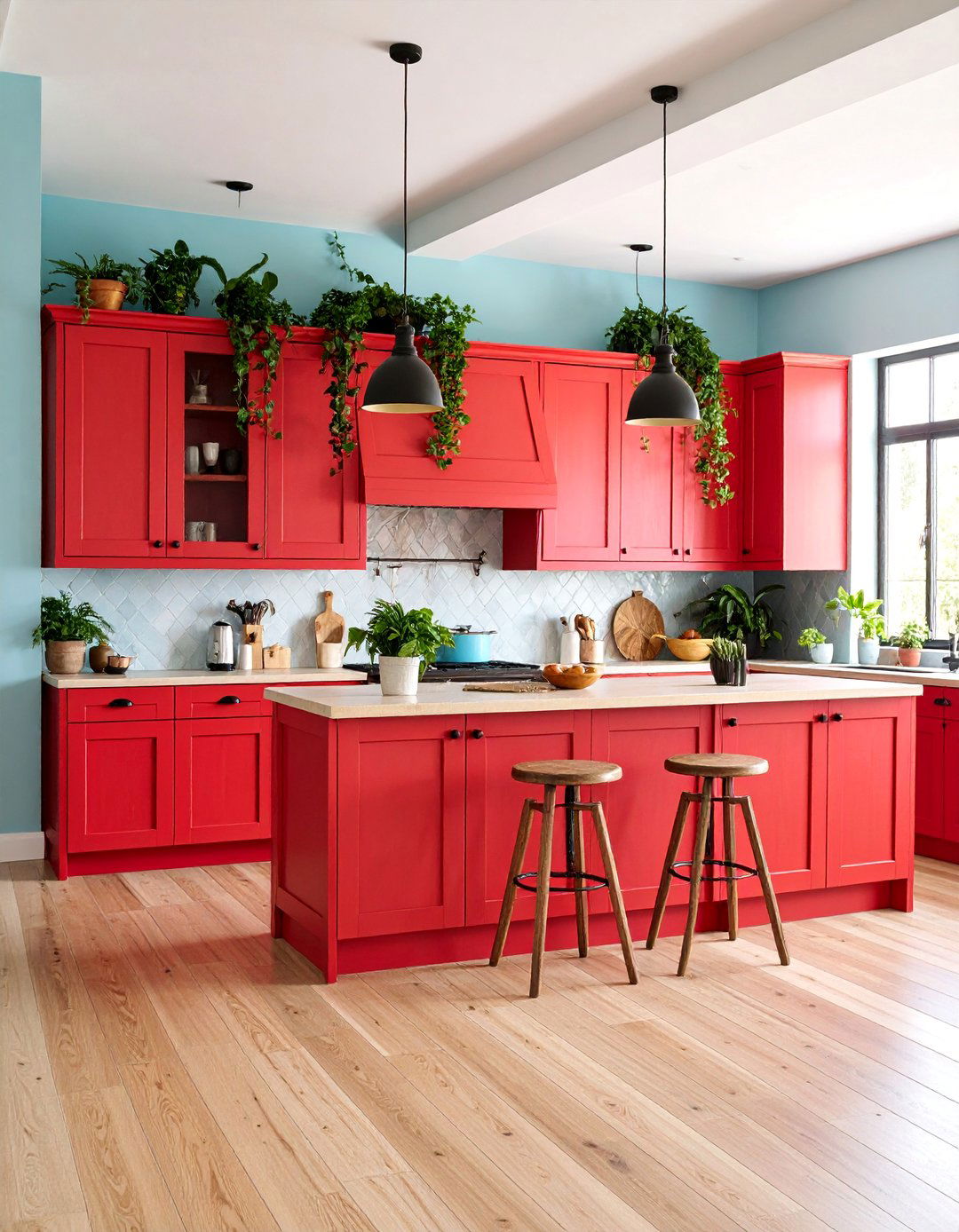


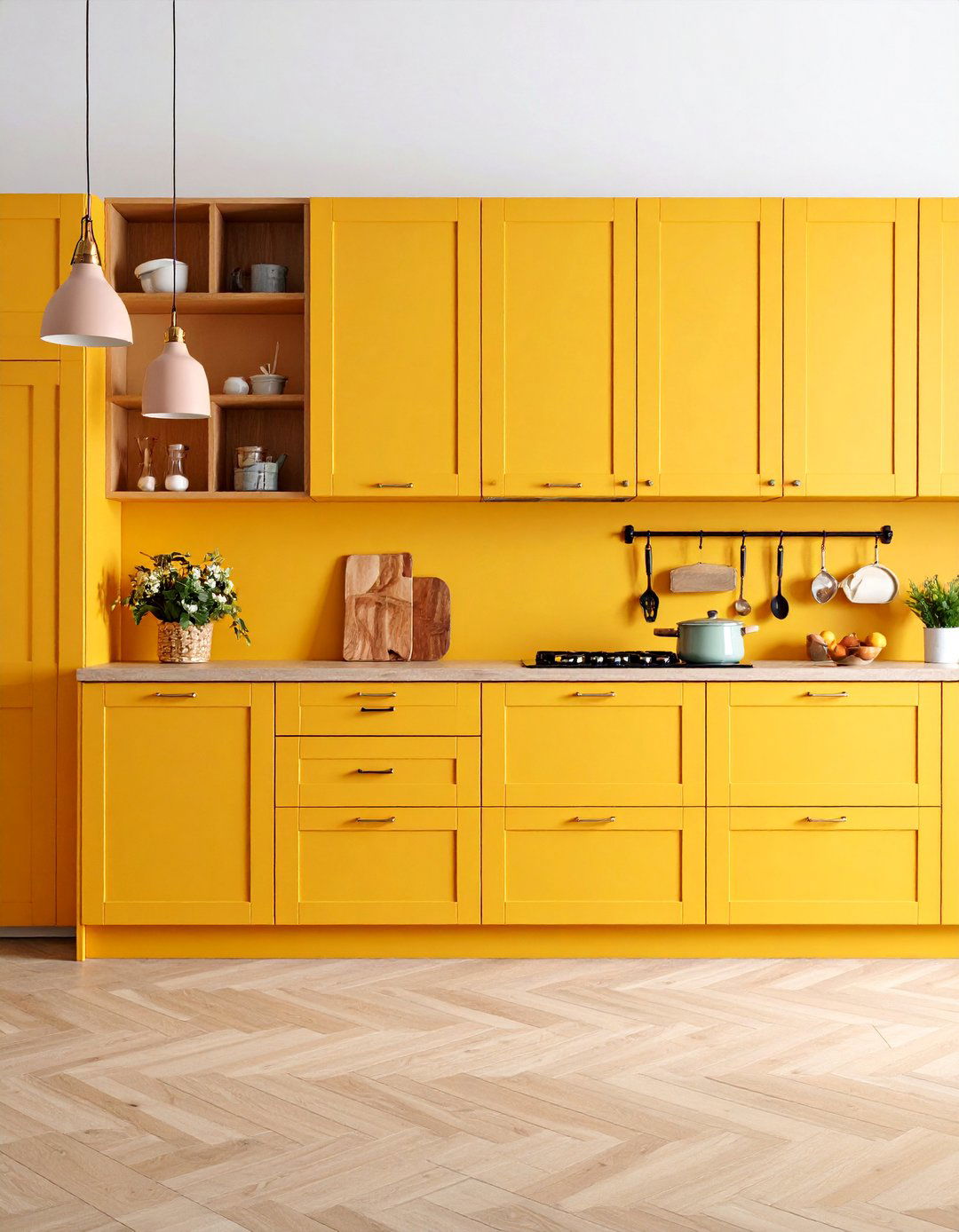

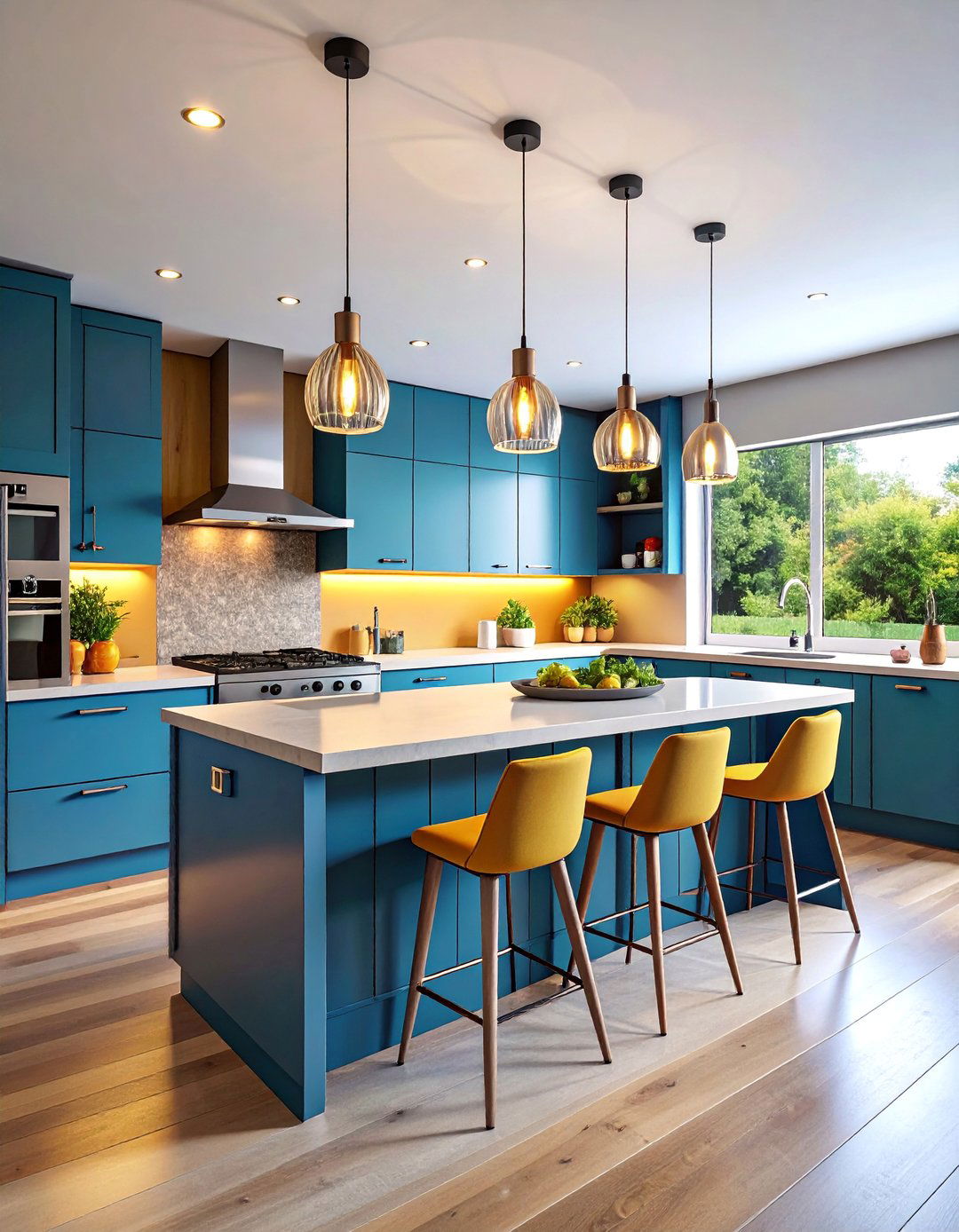
Leave a Reply